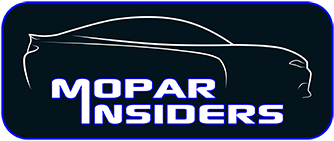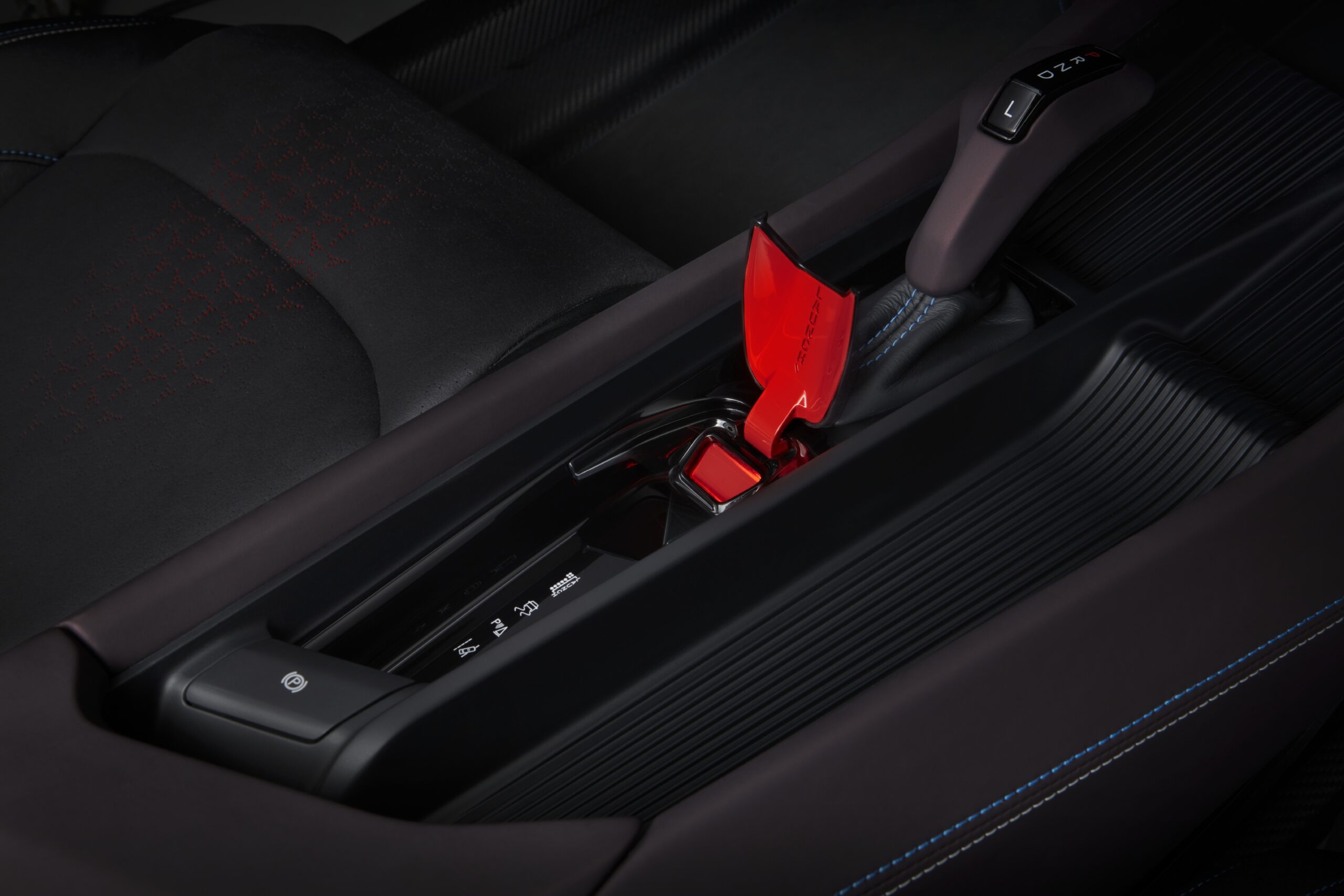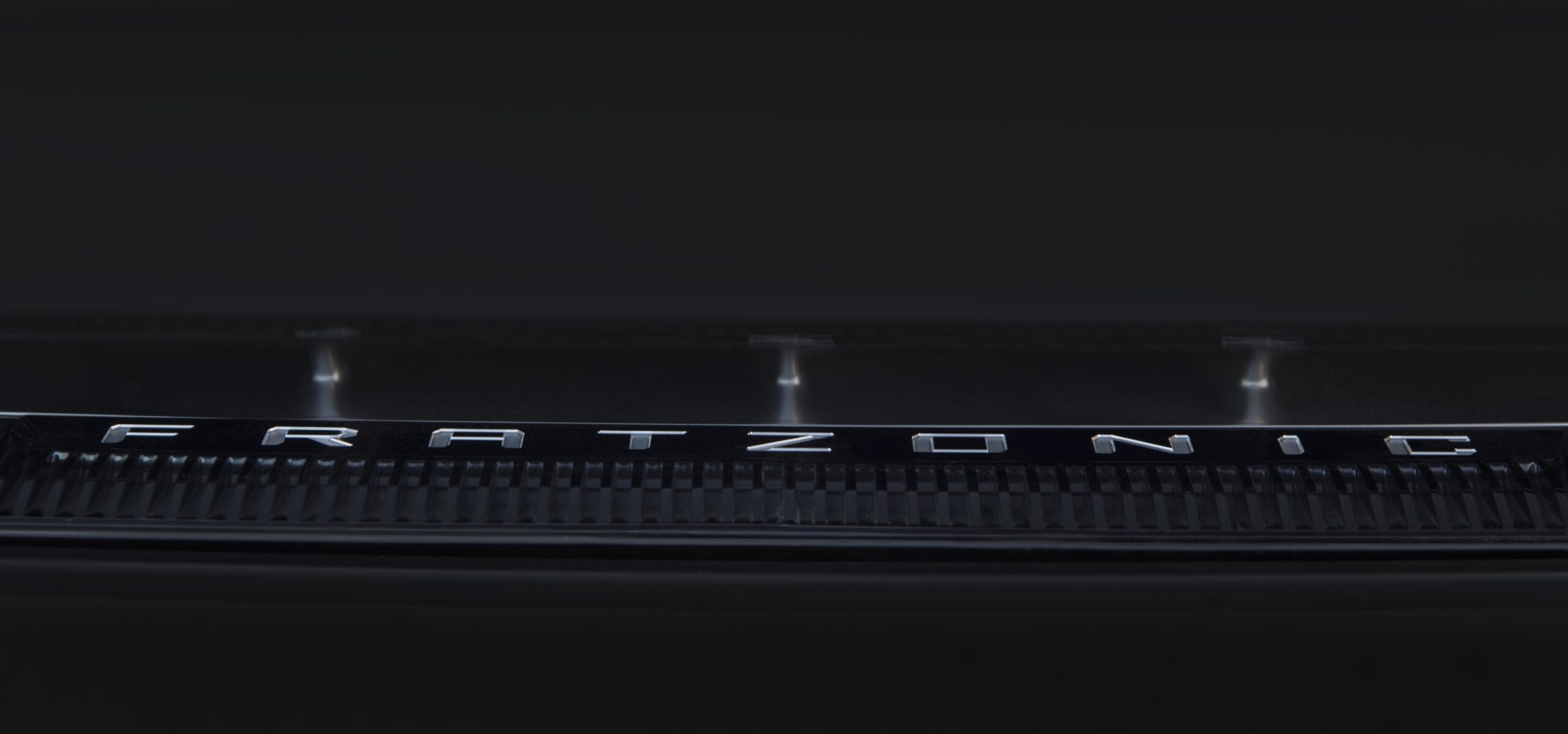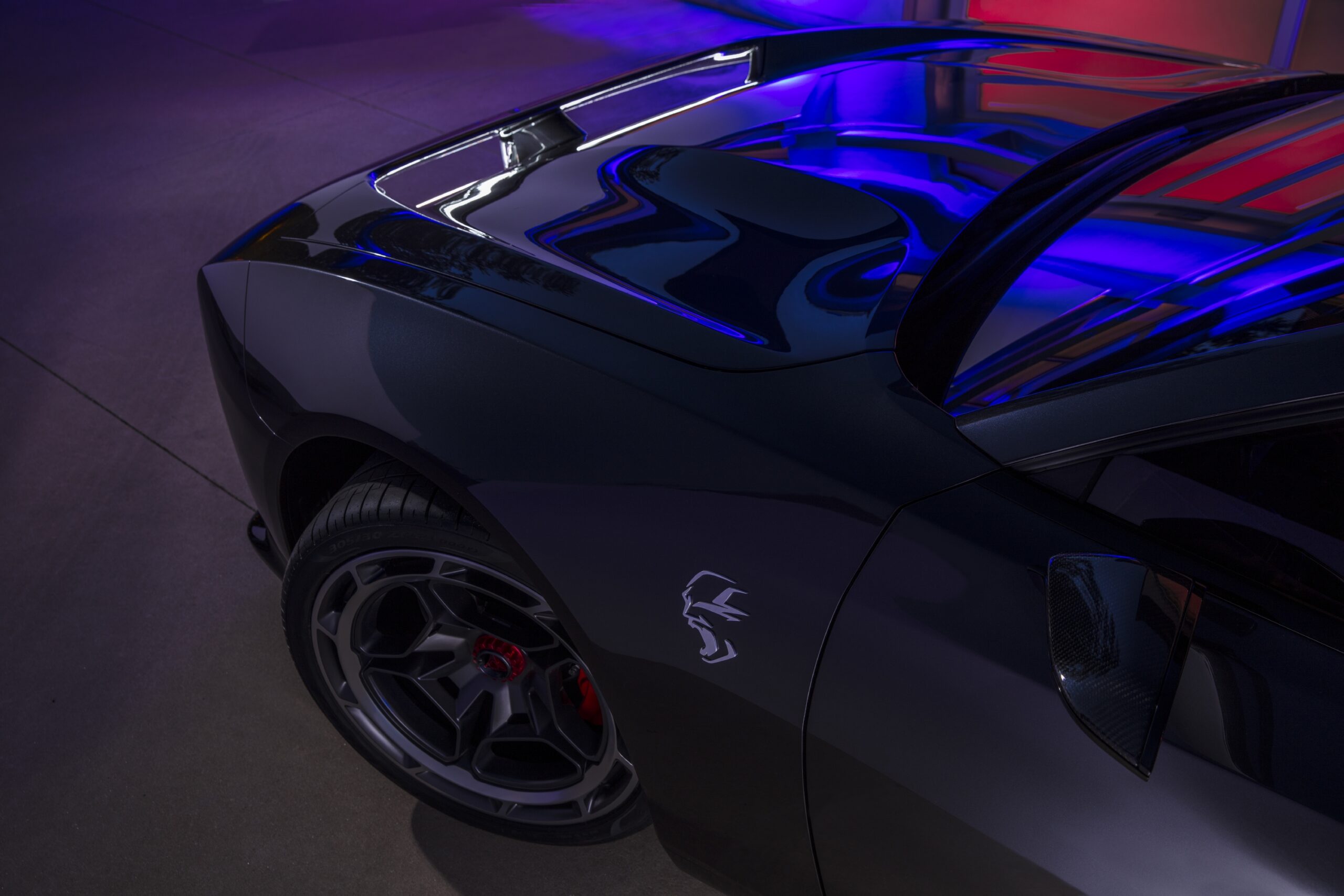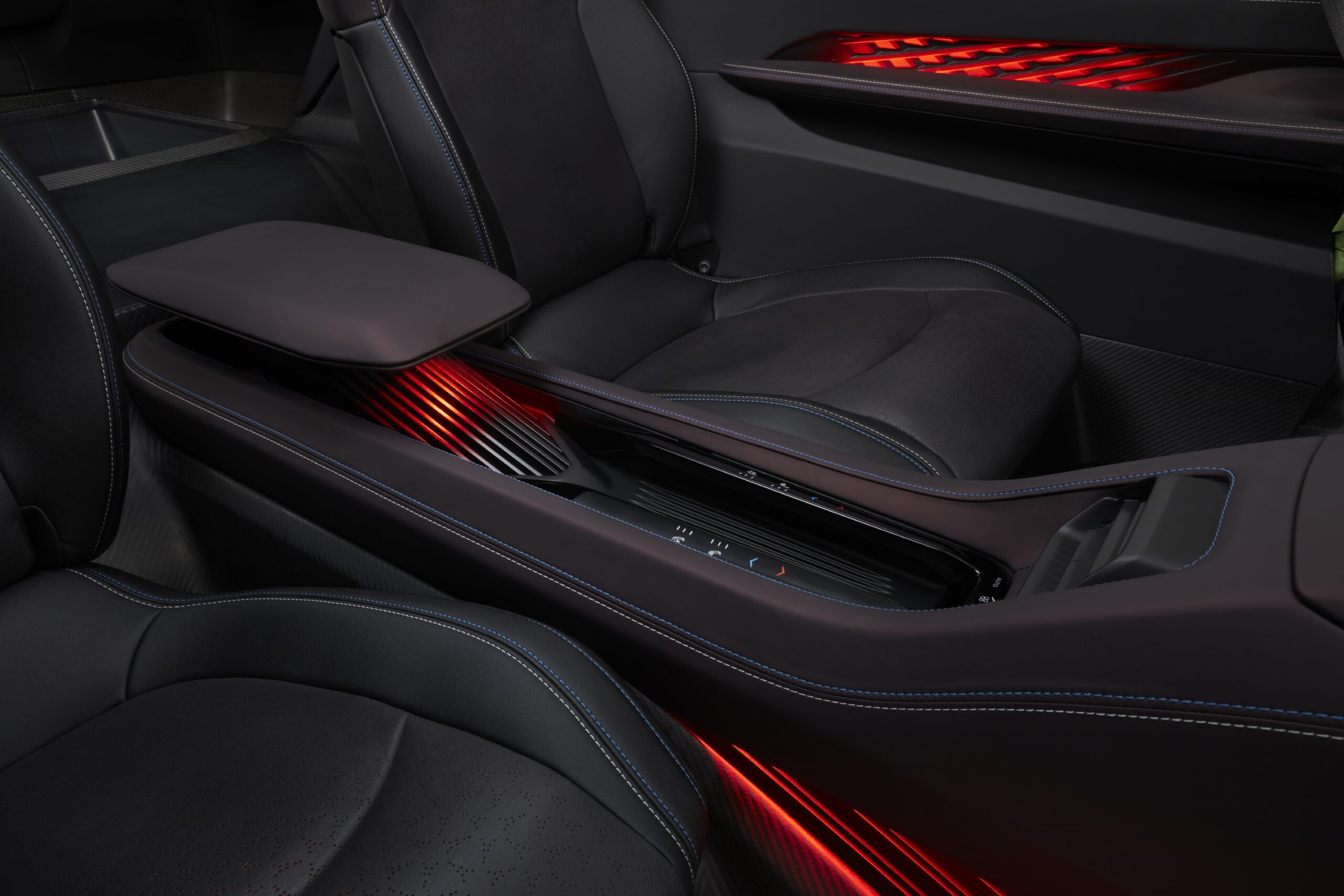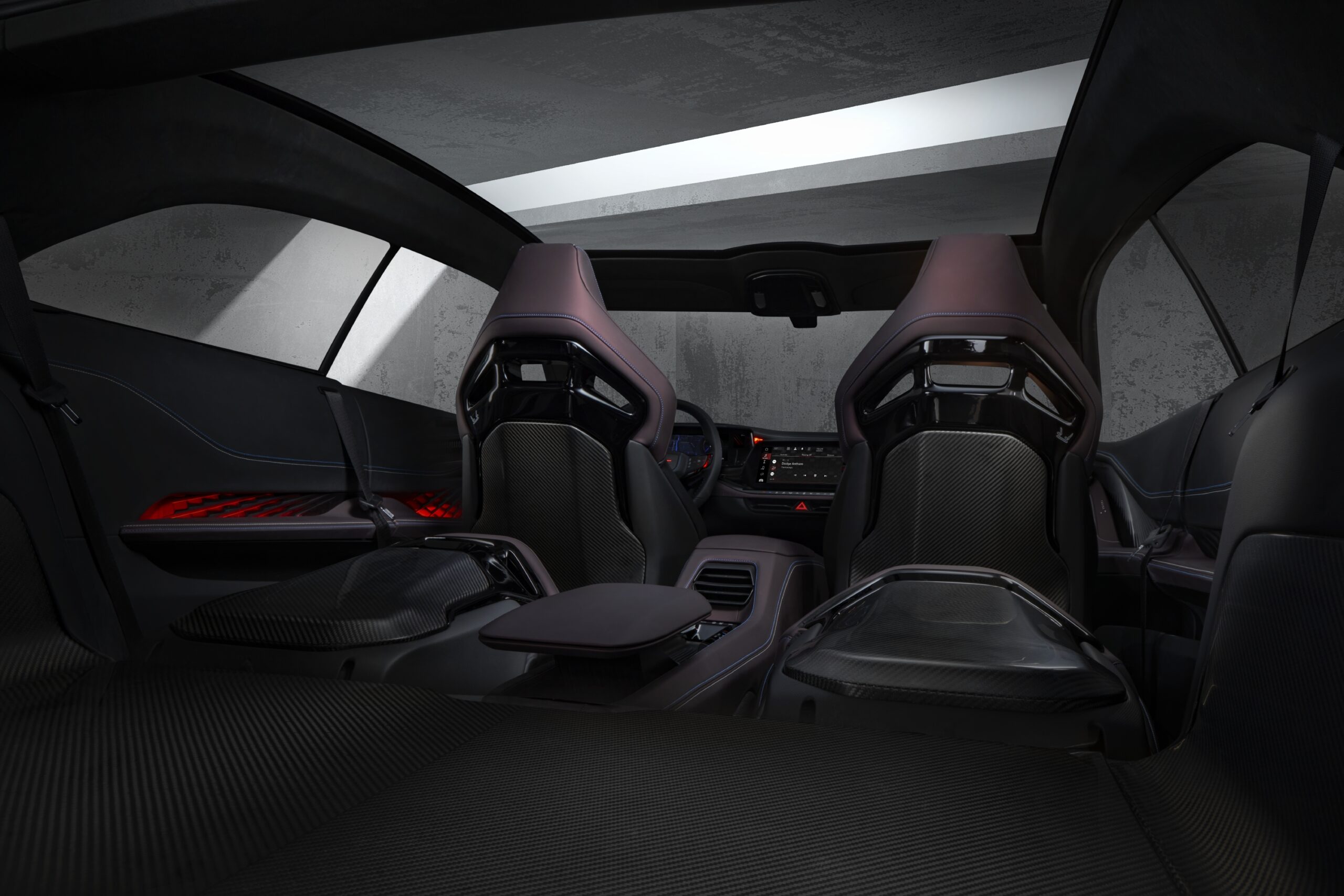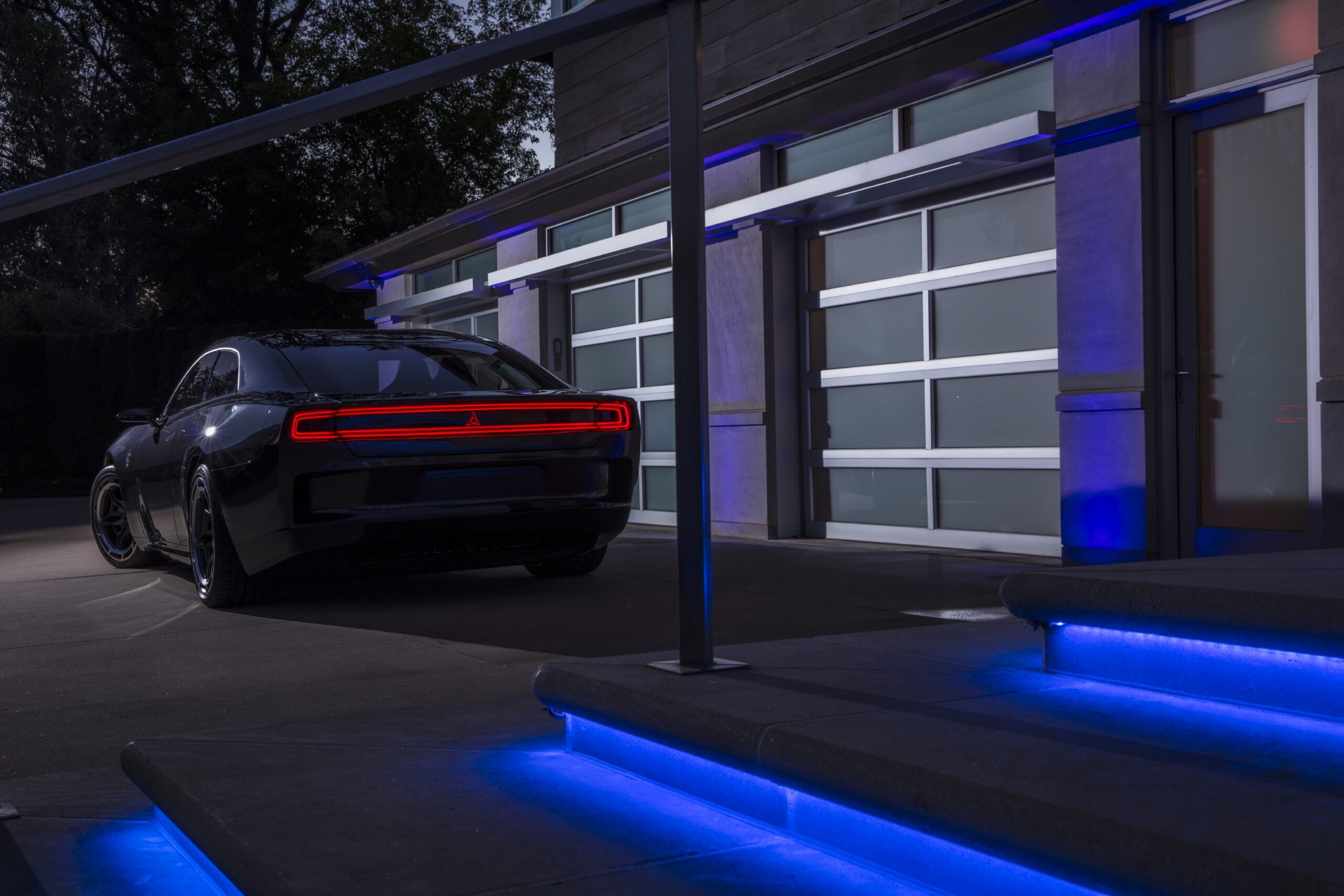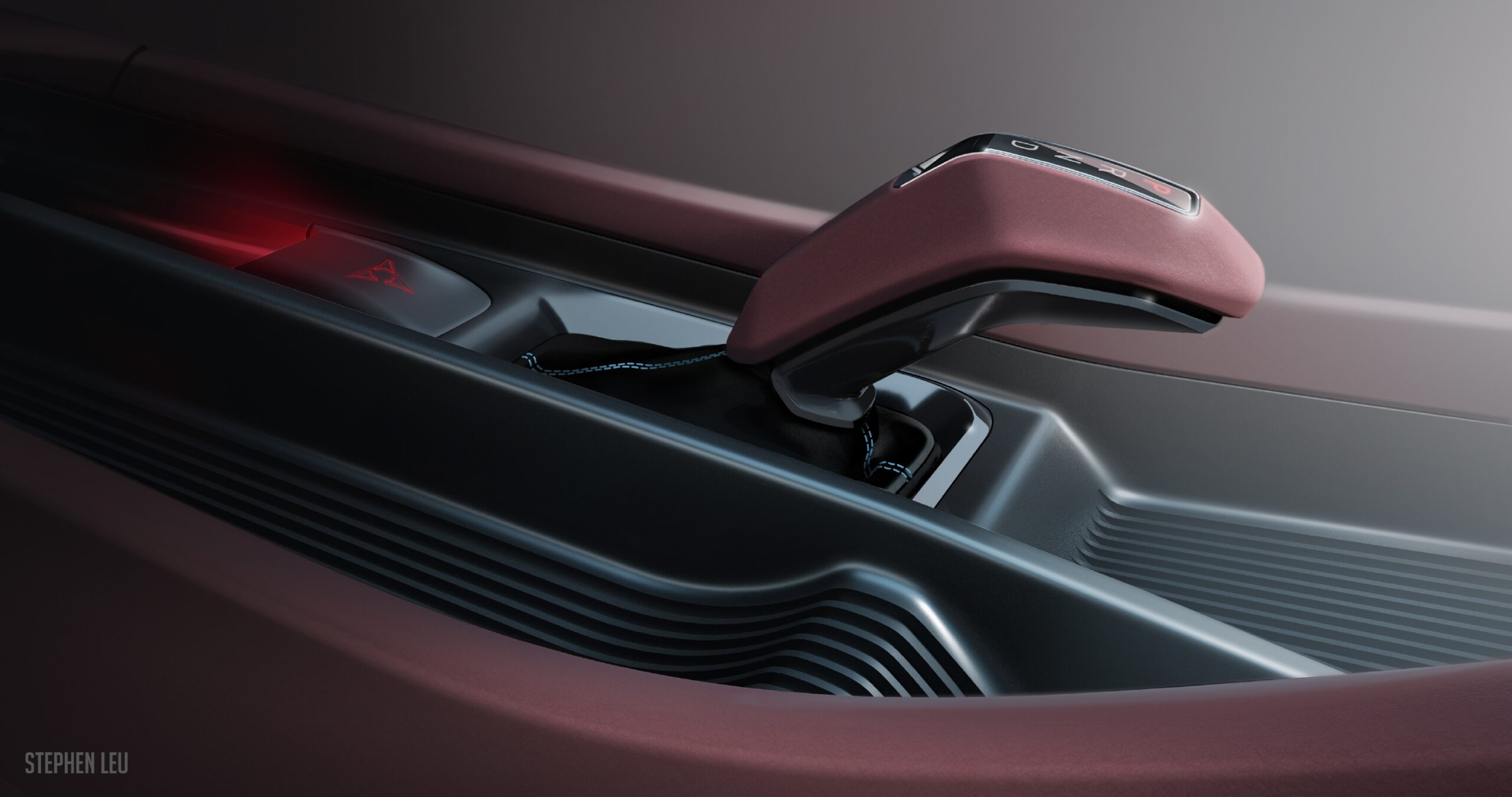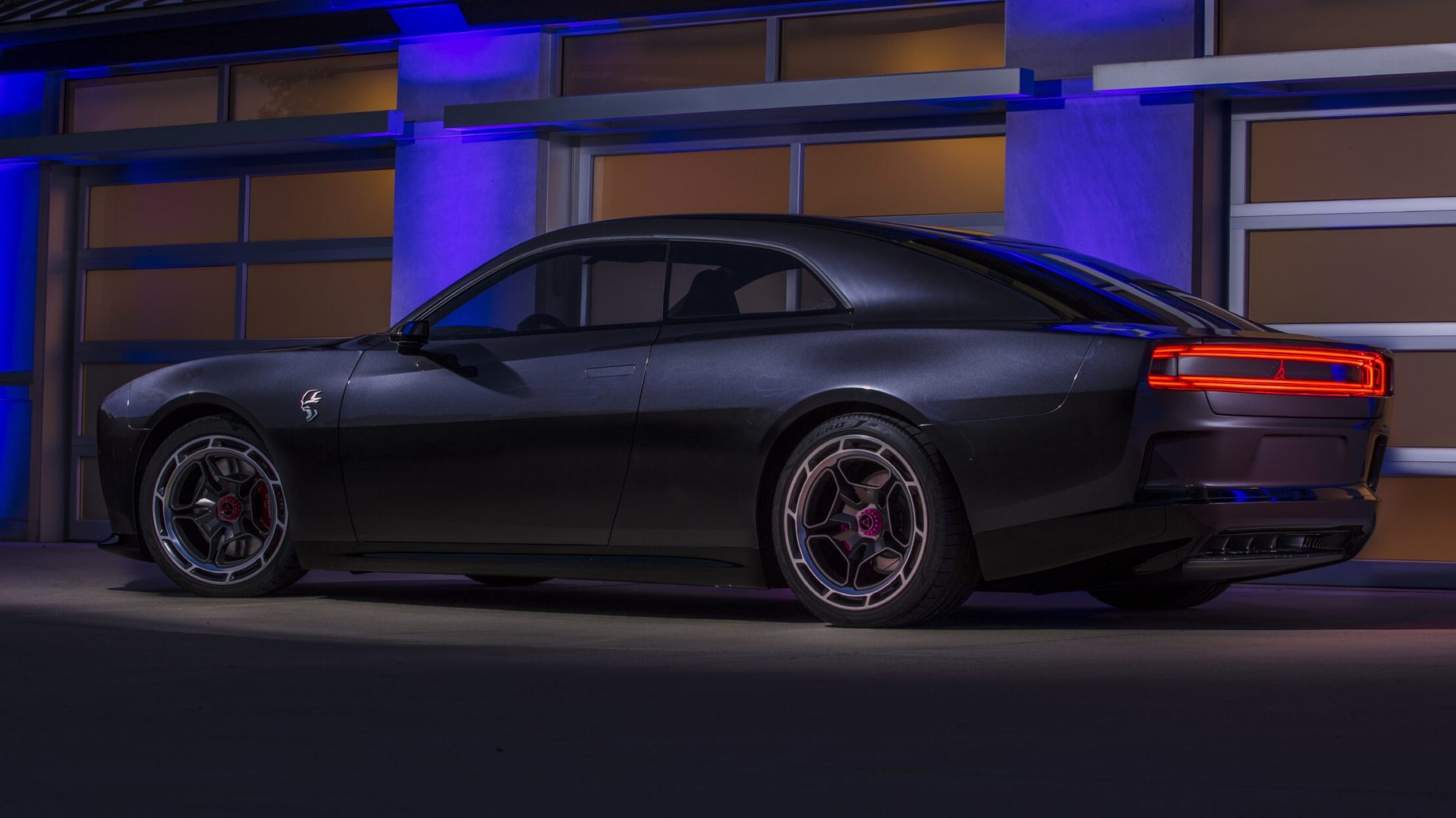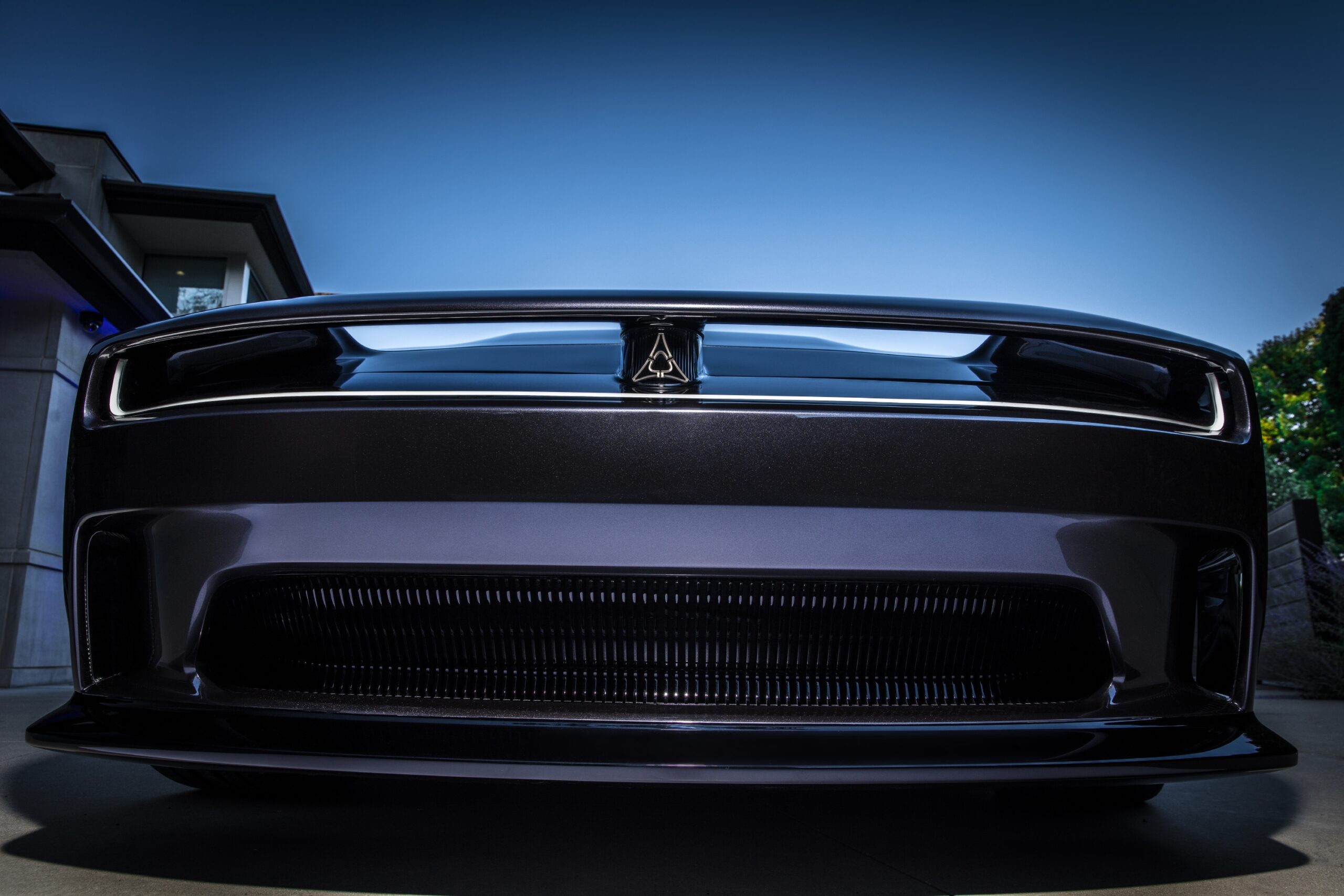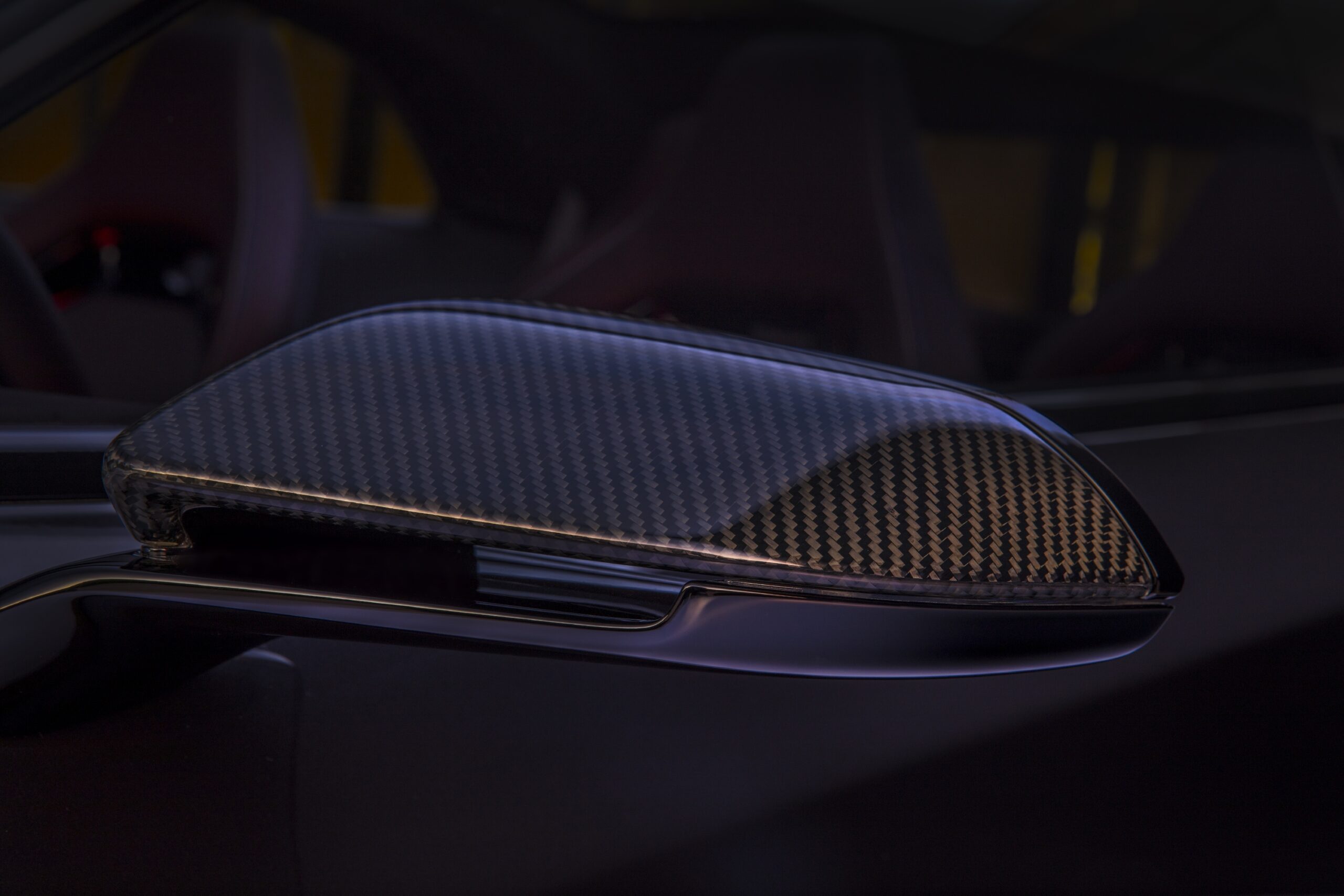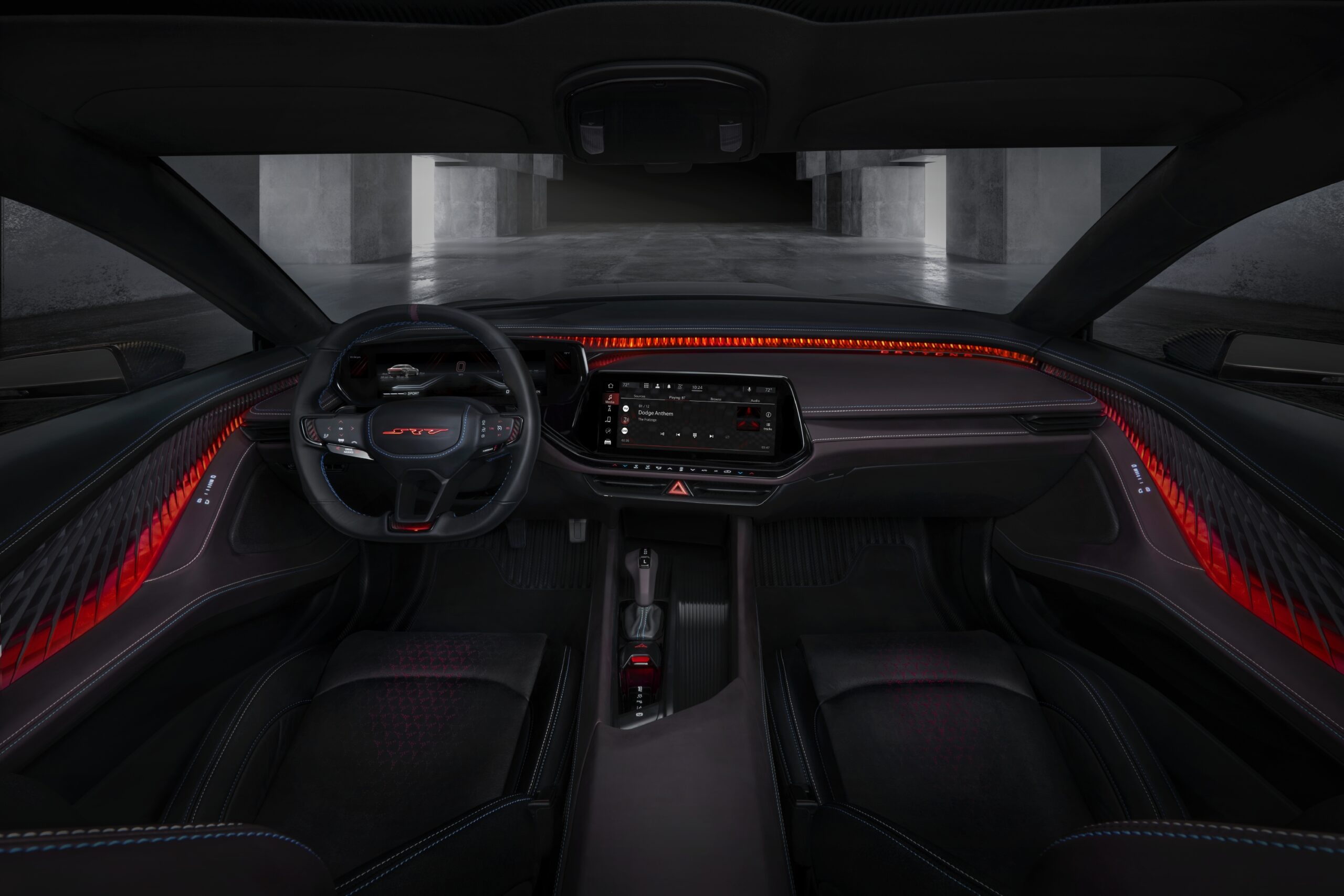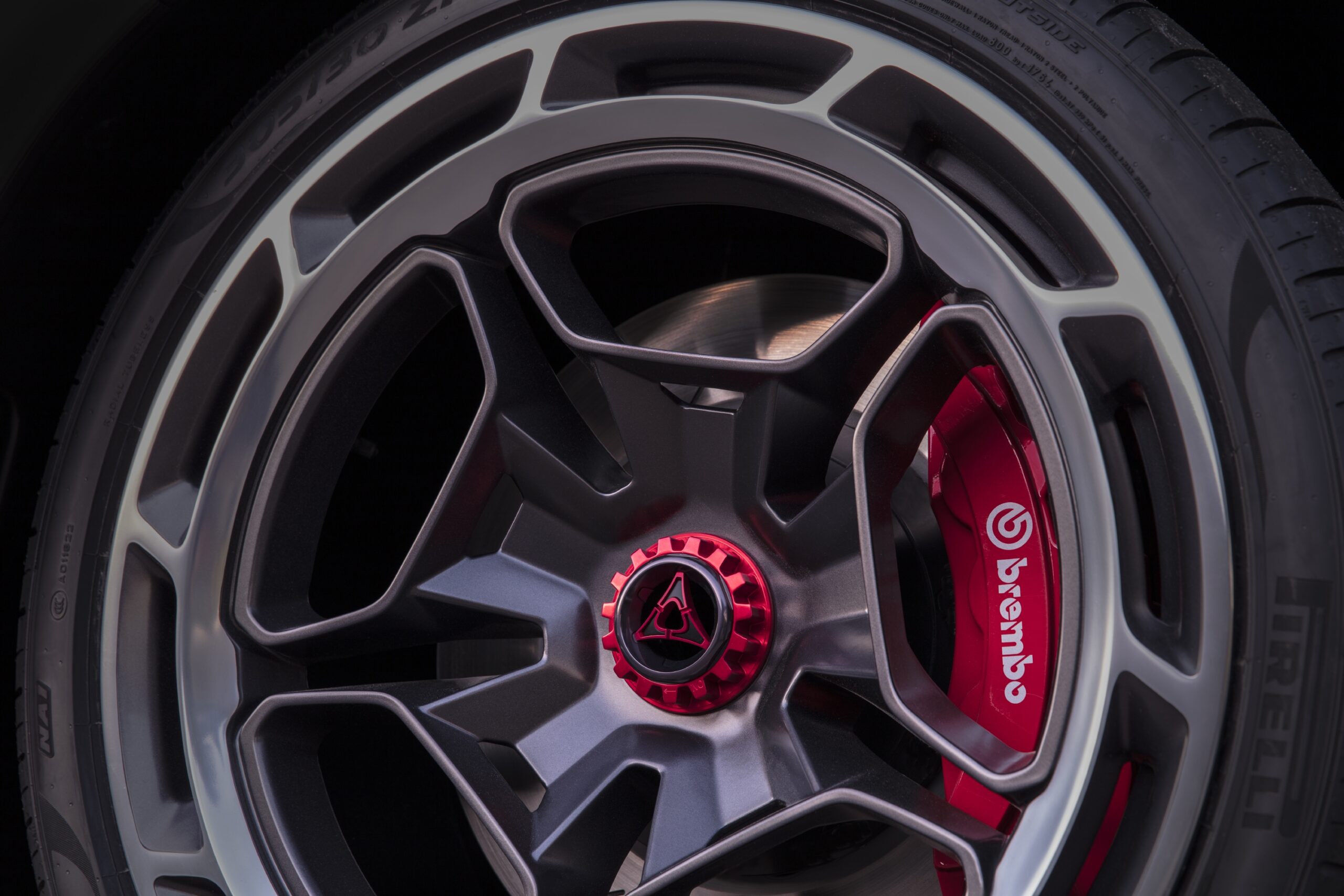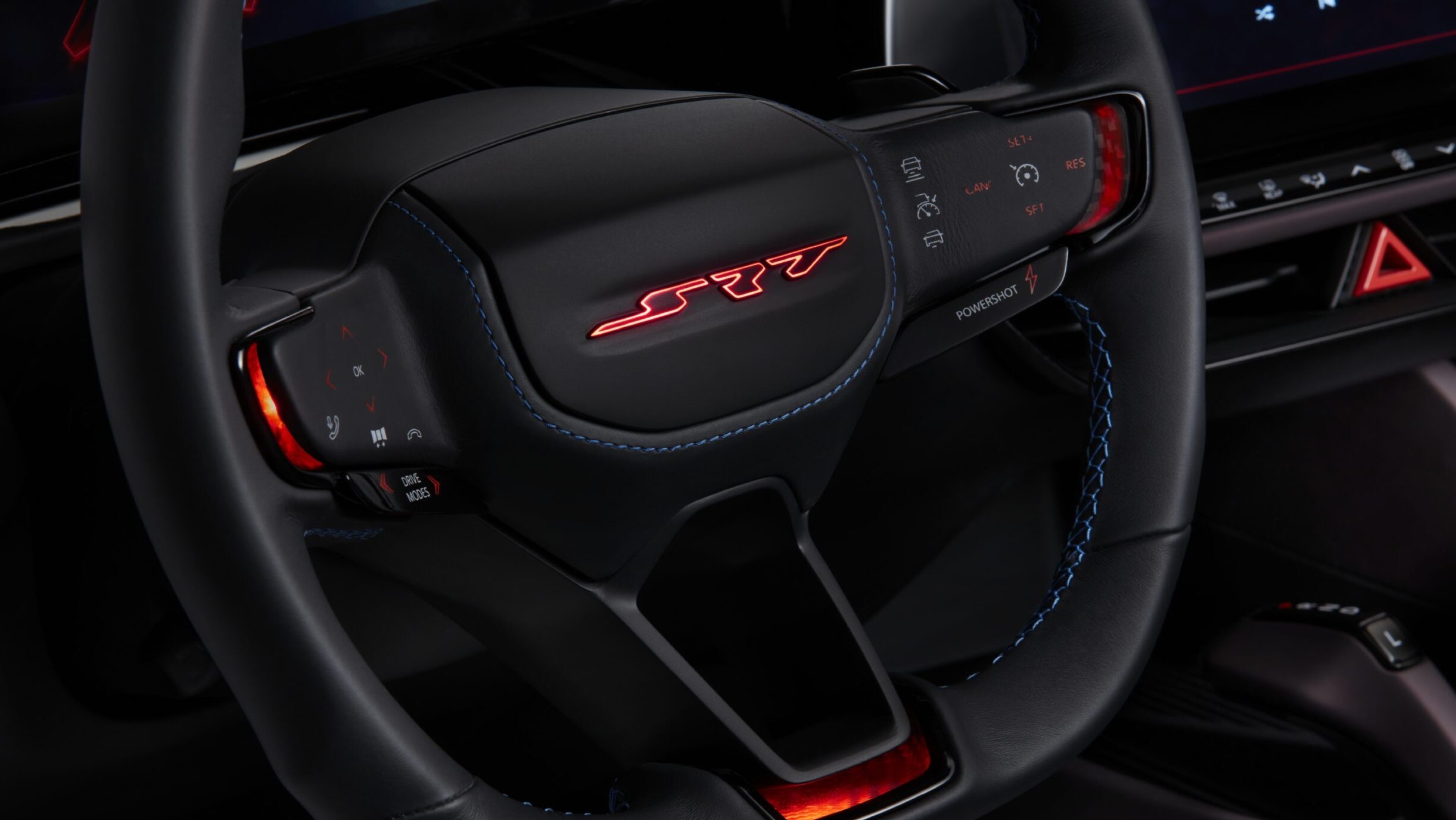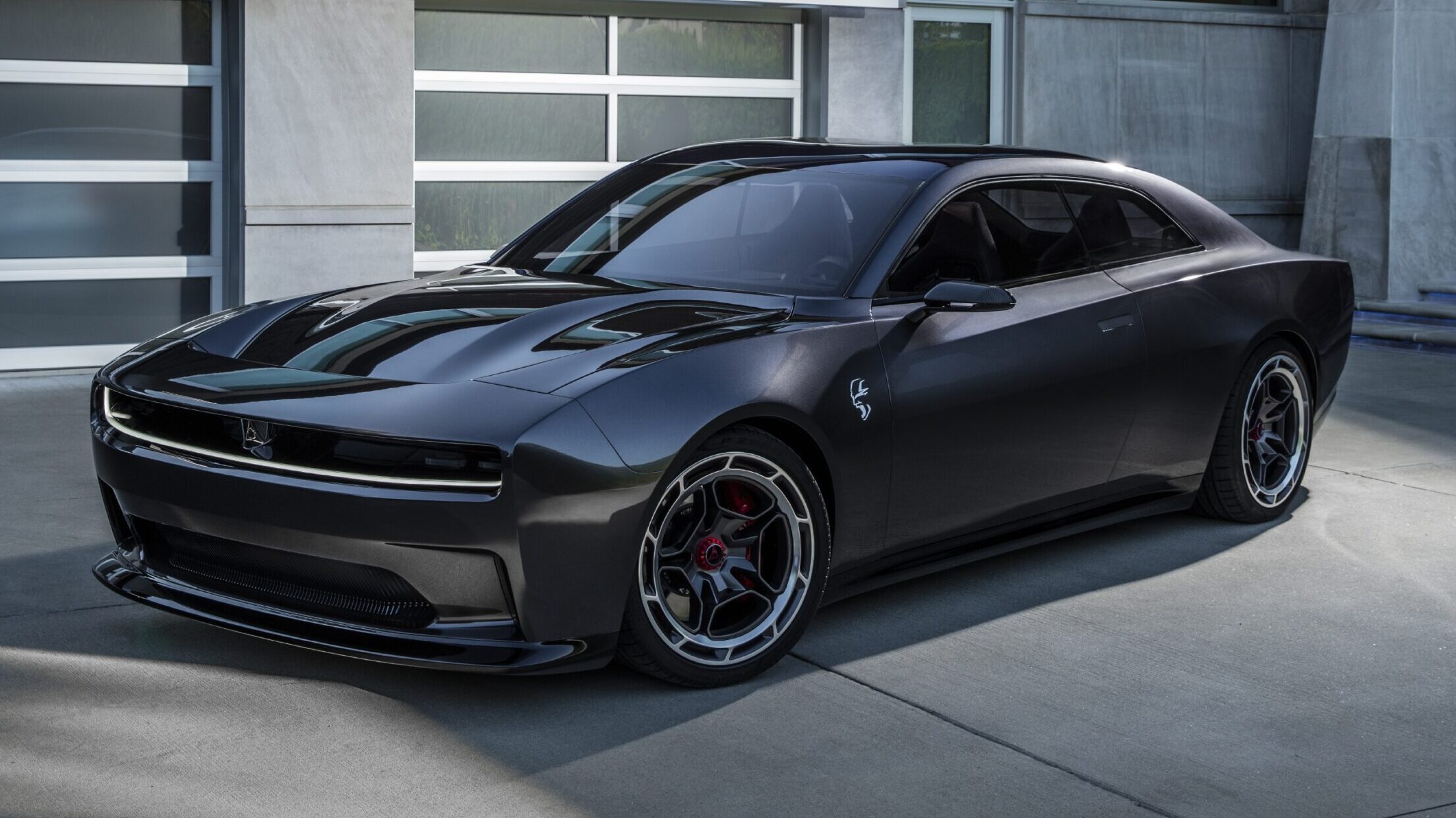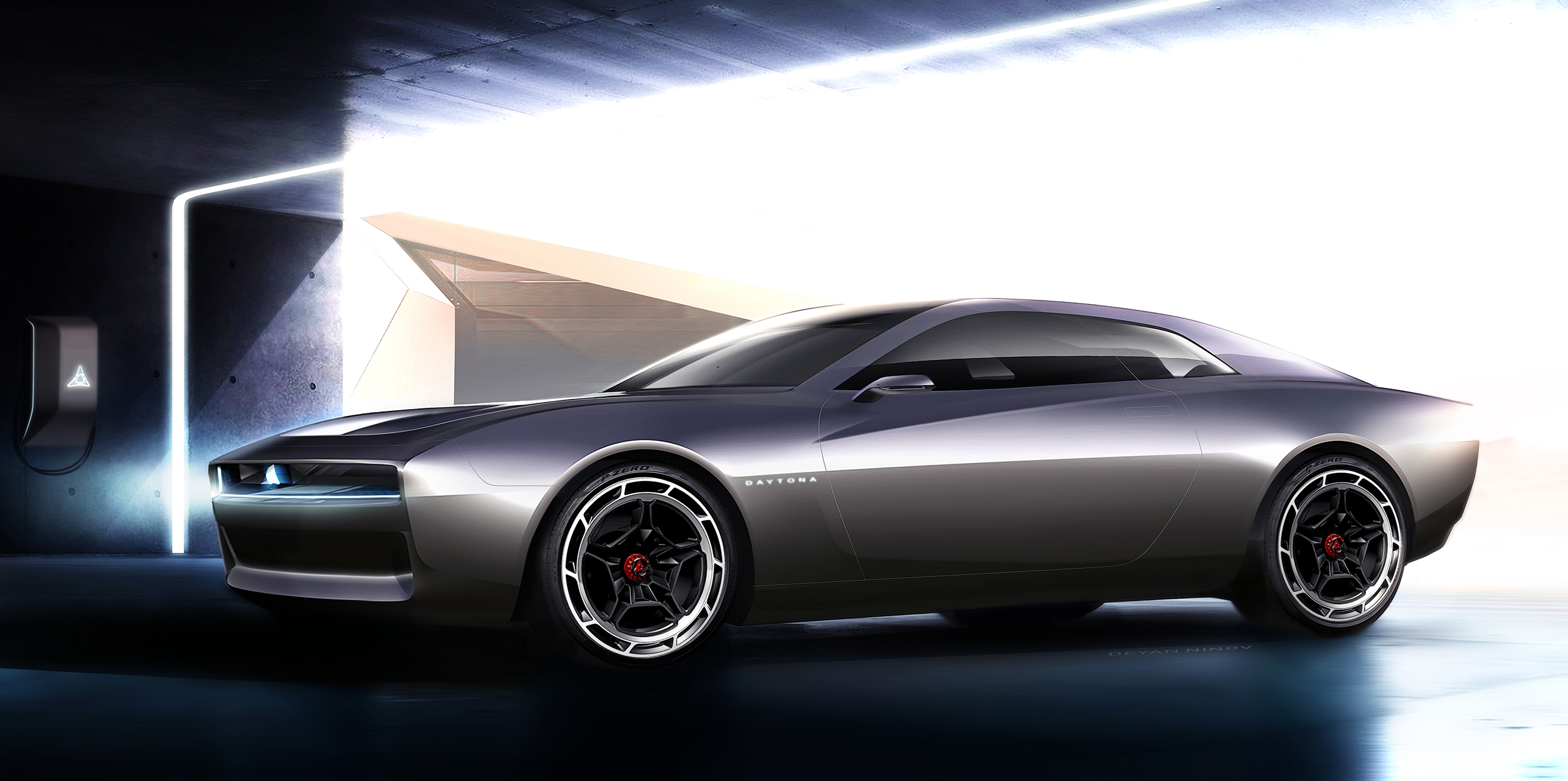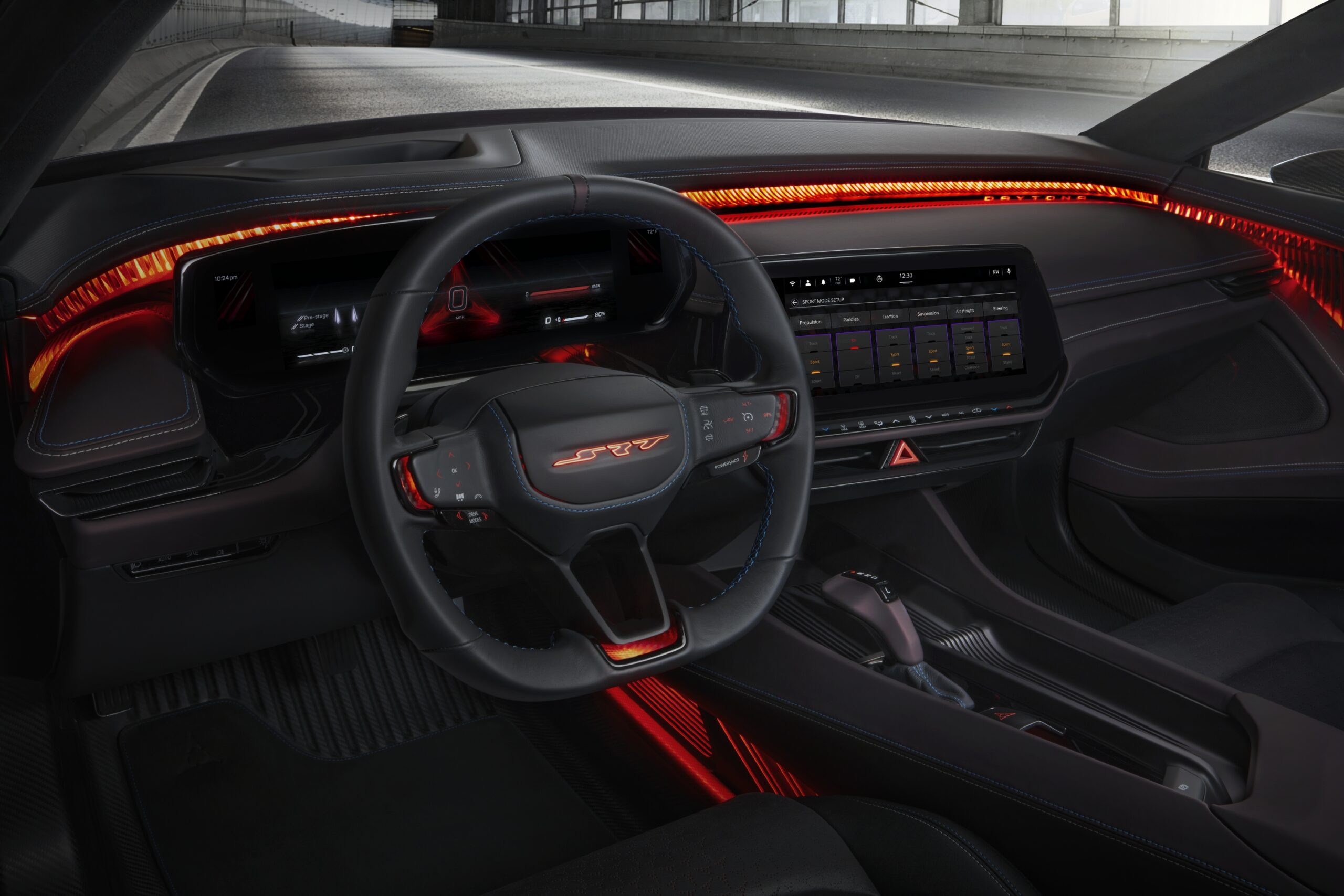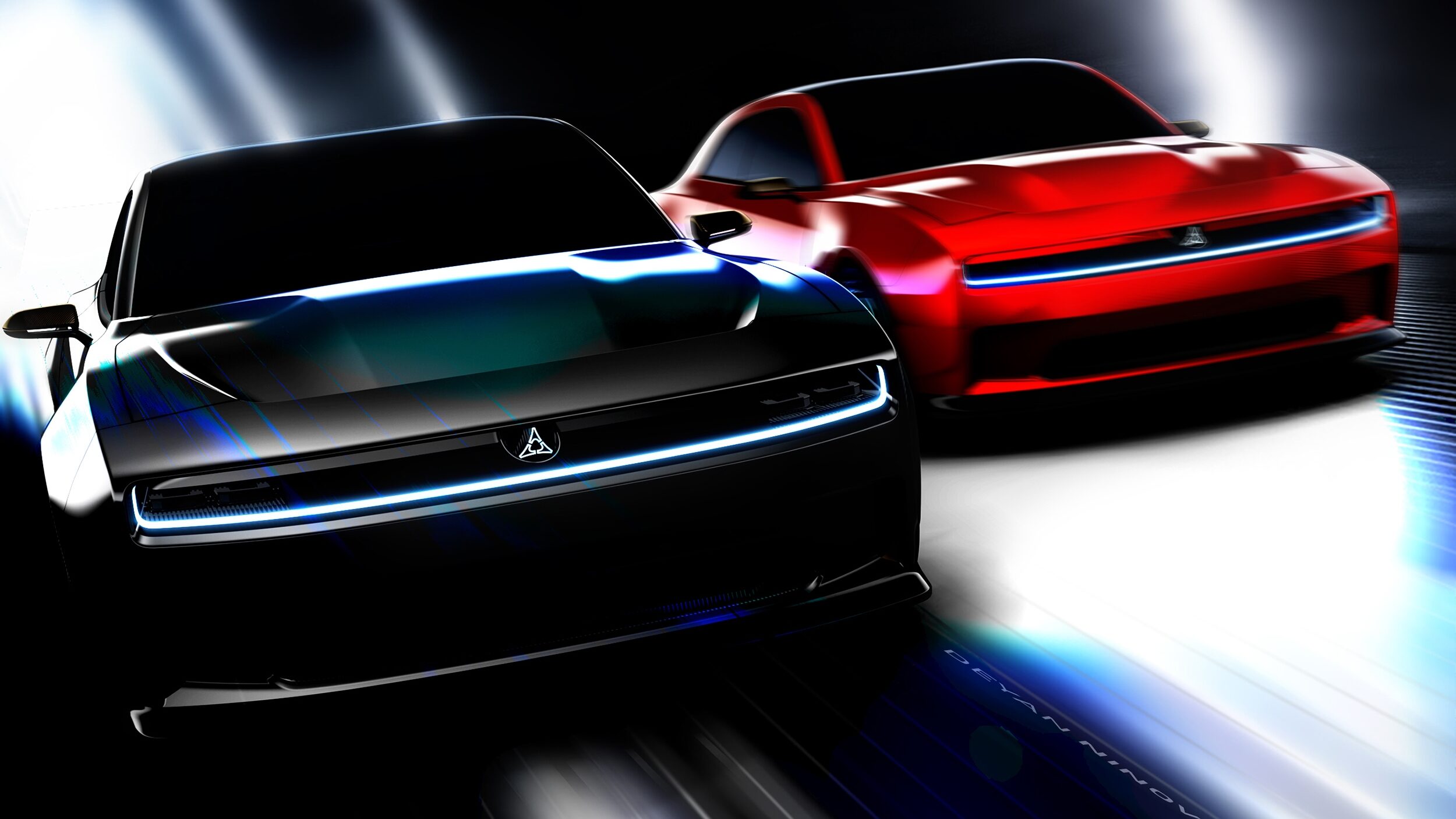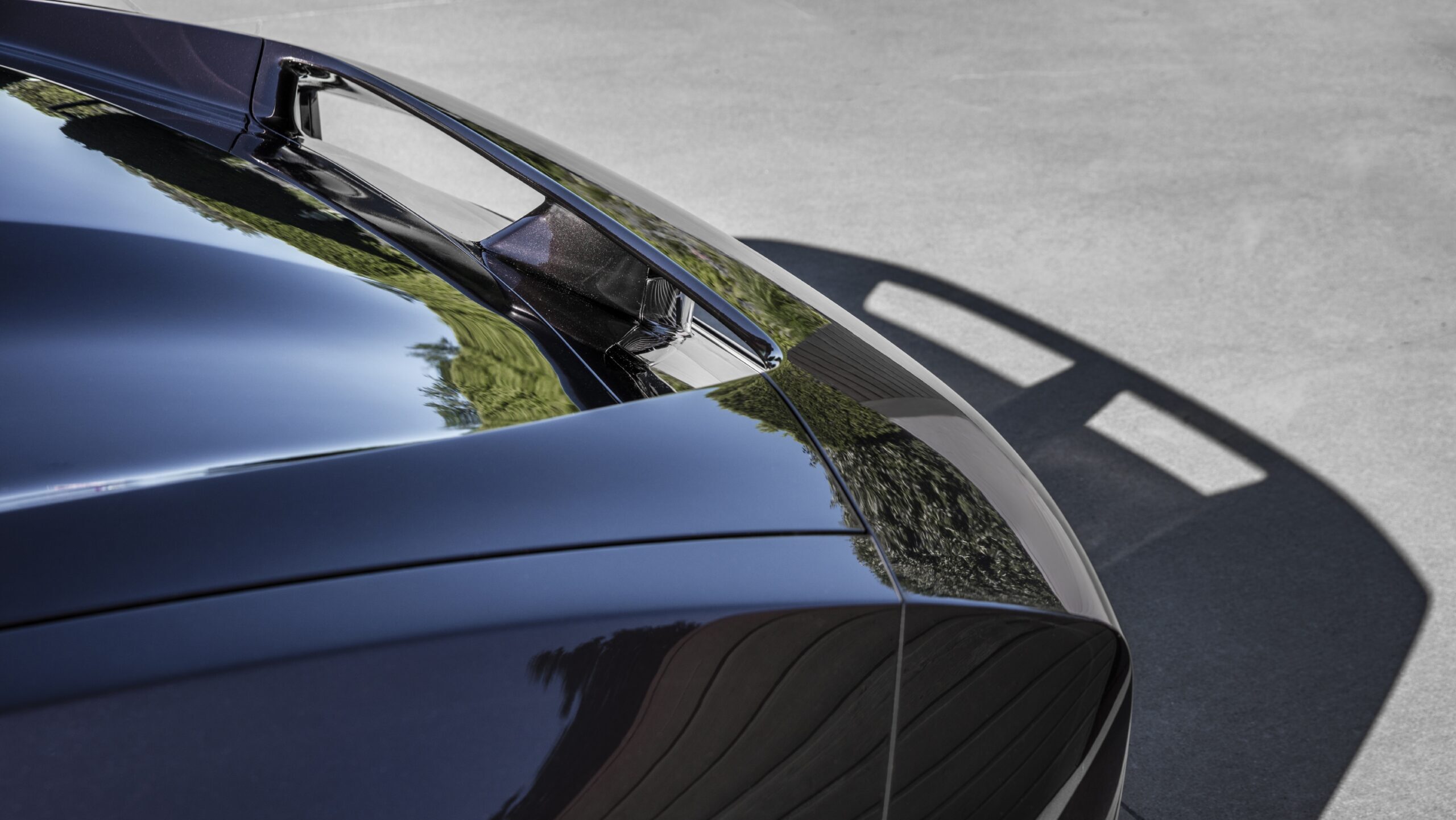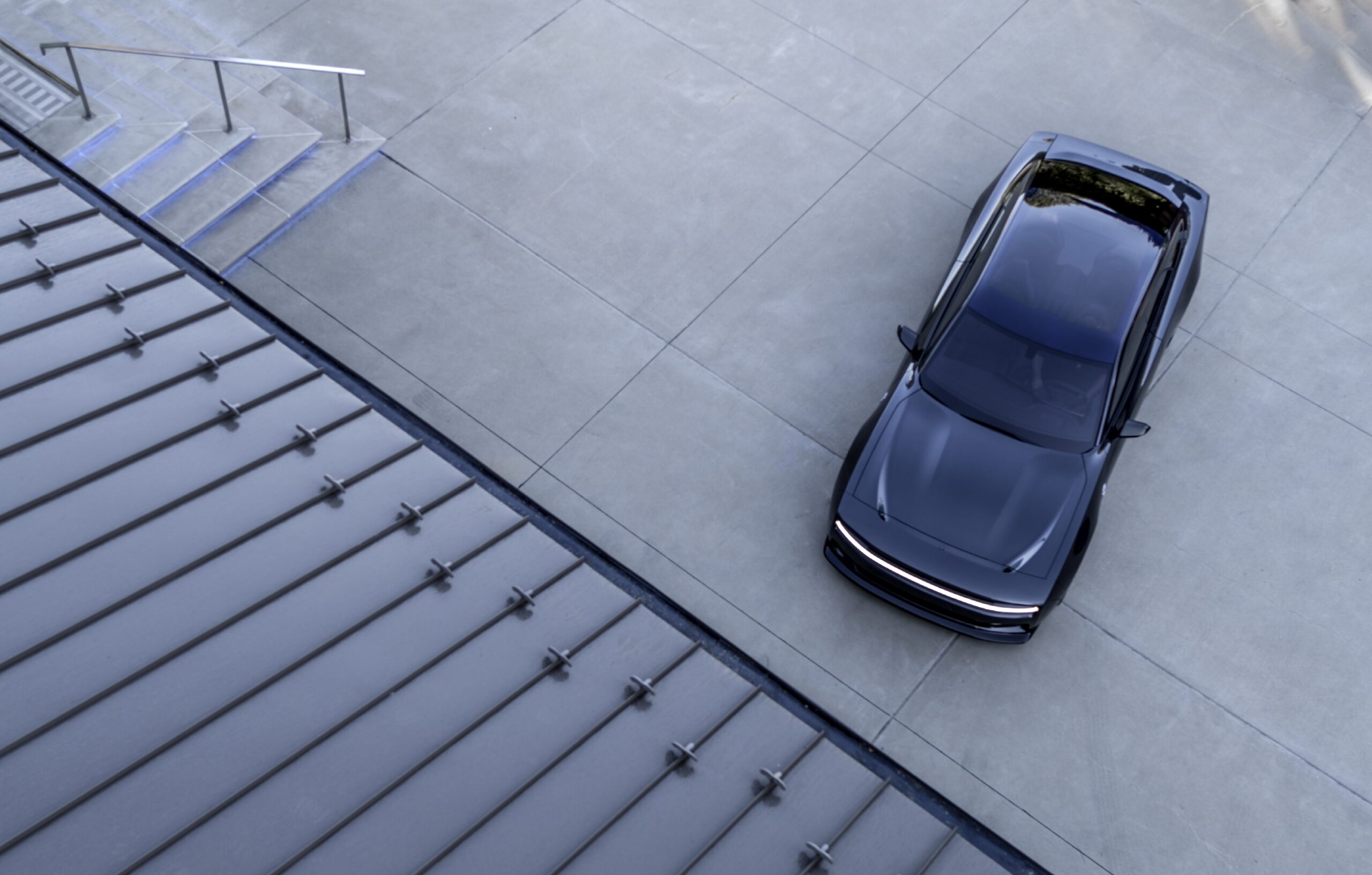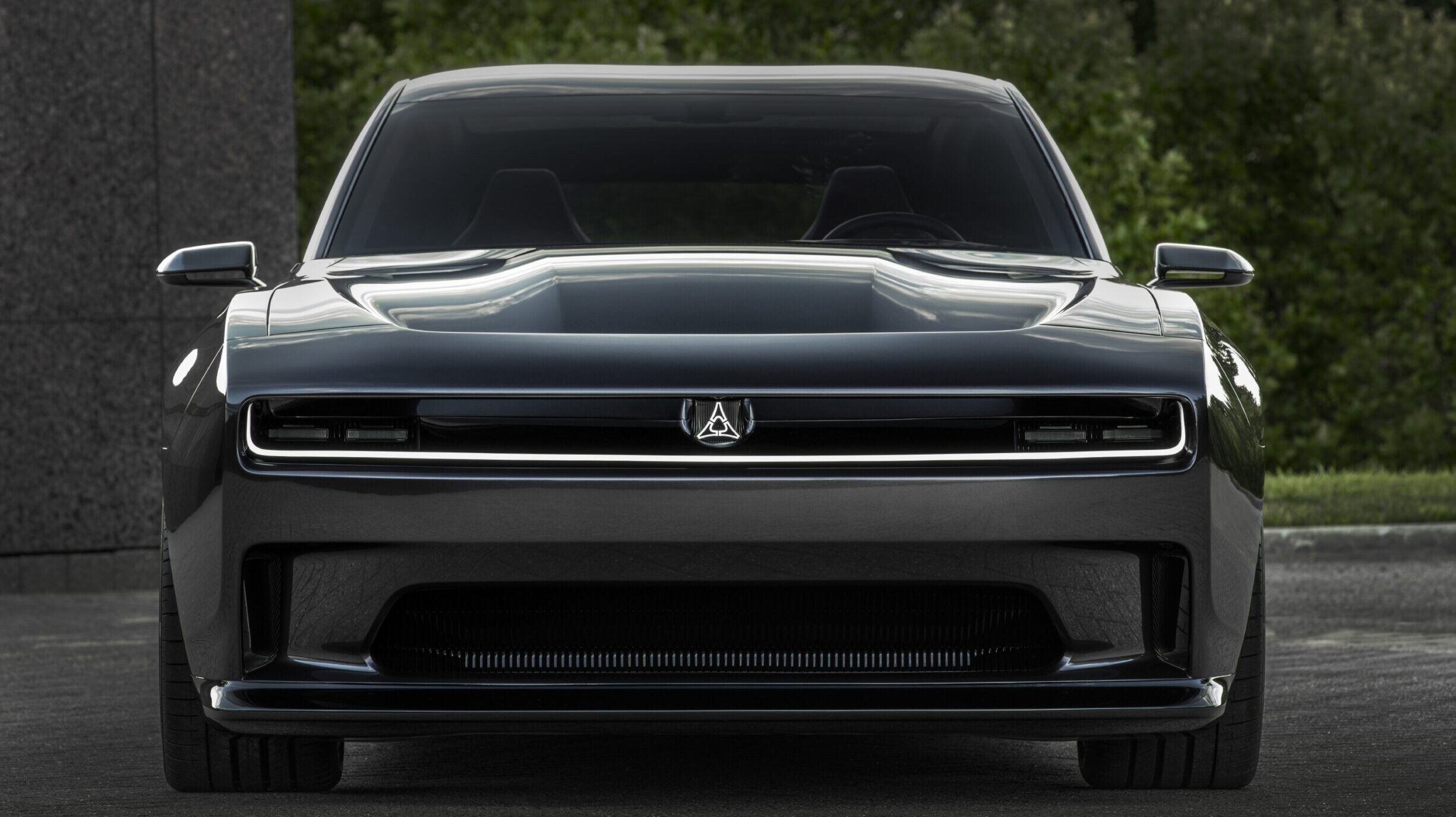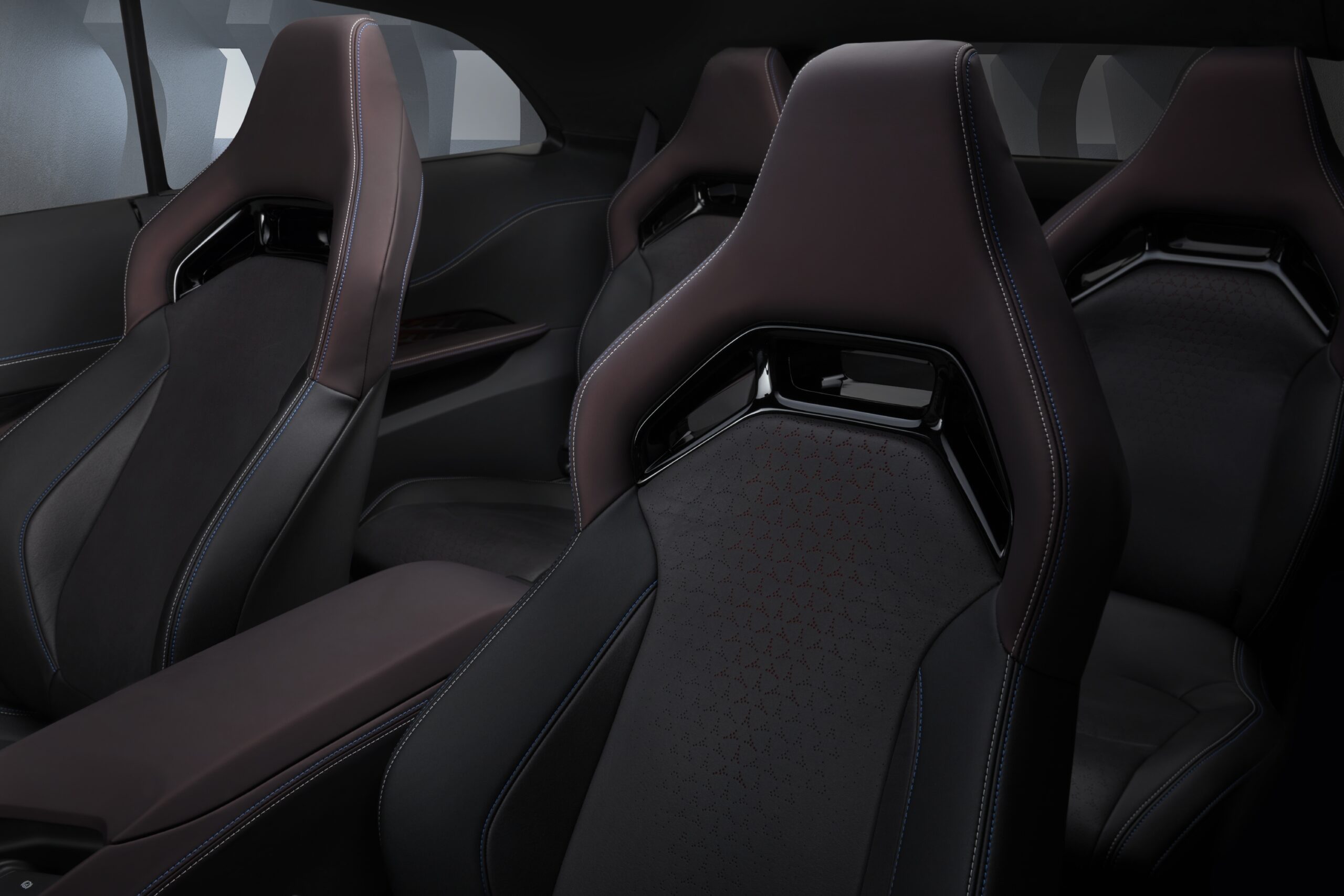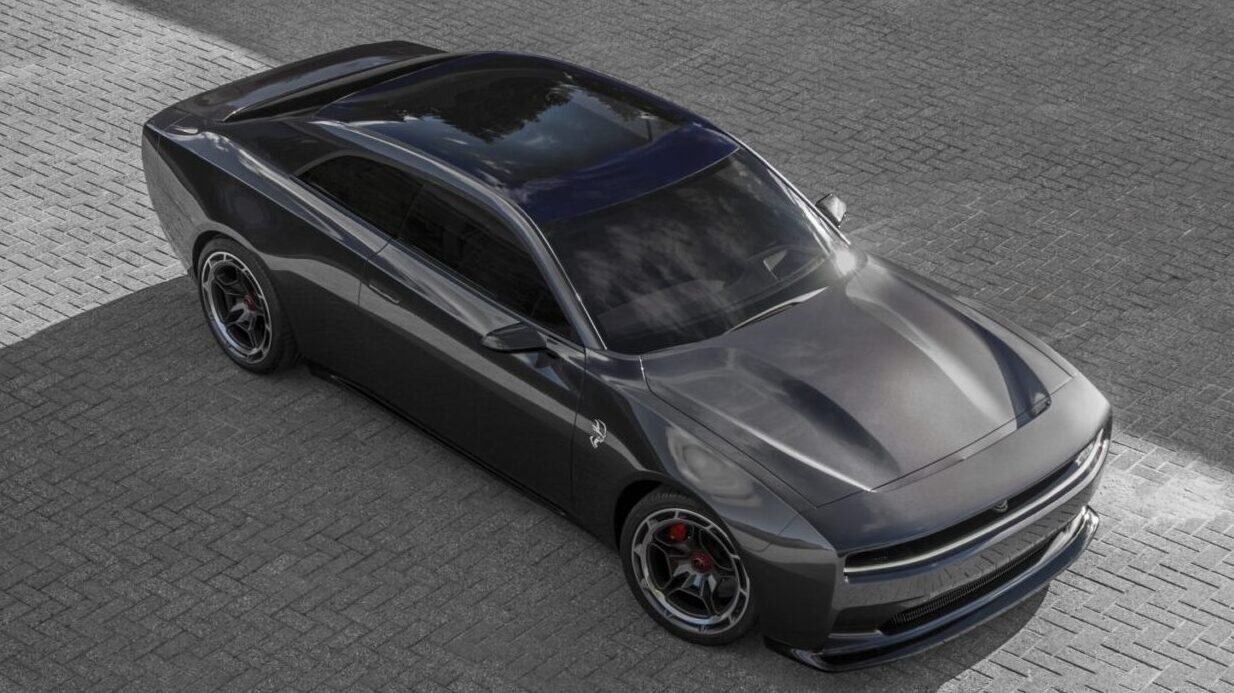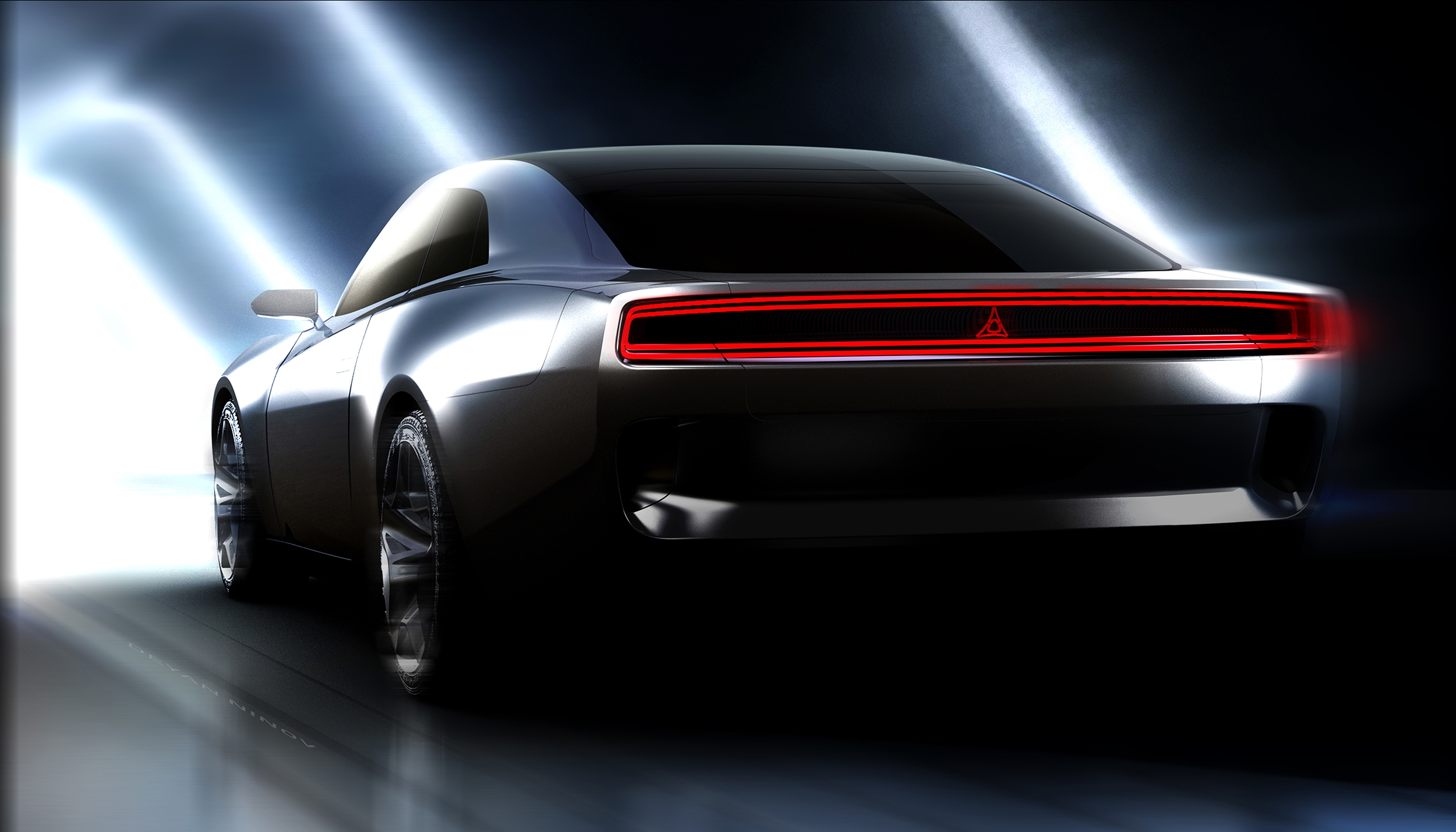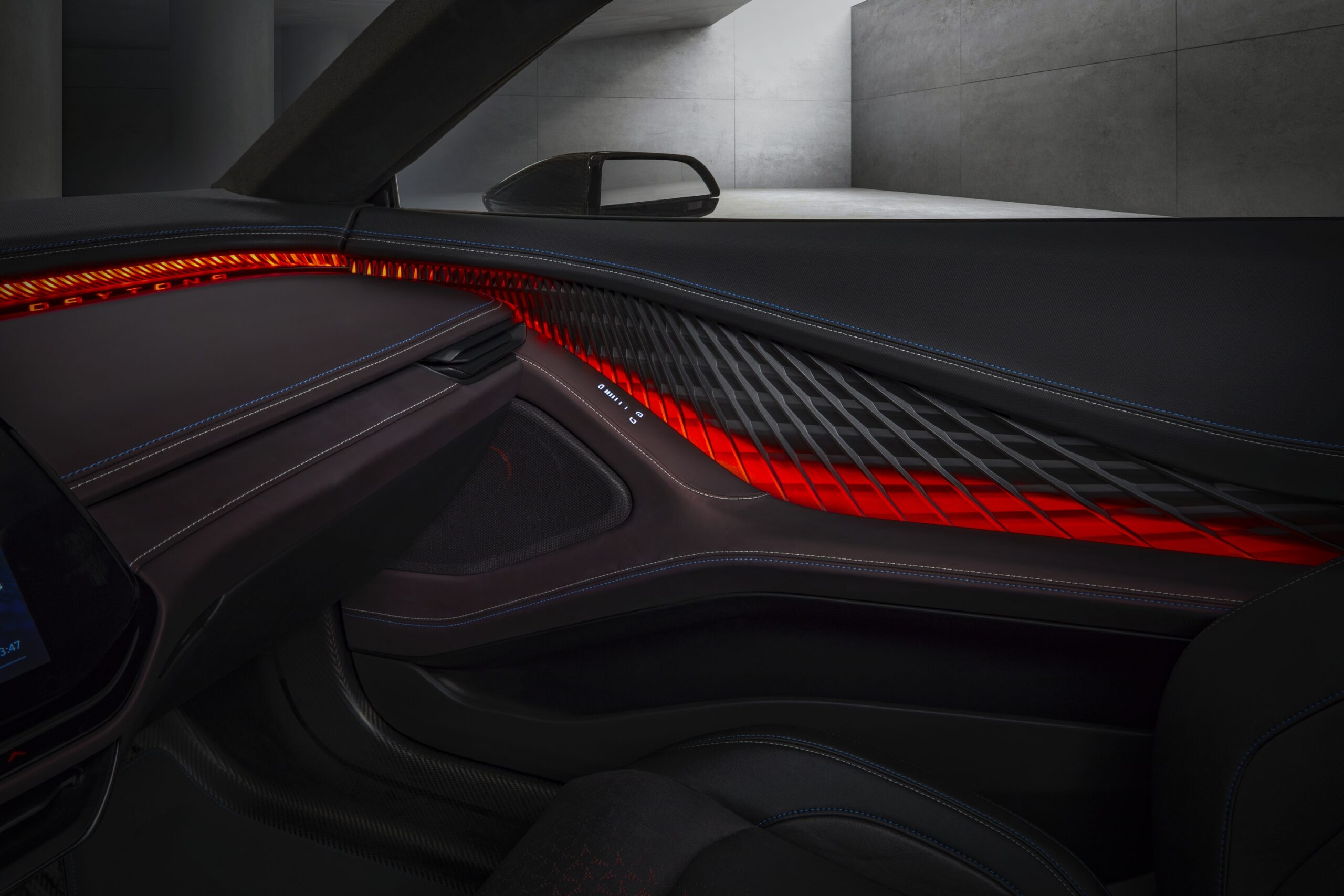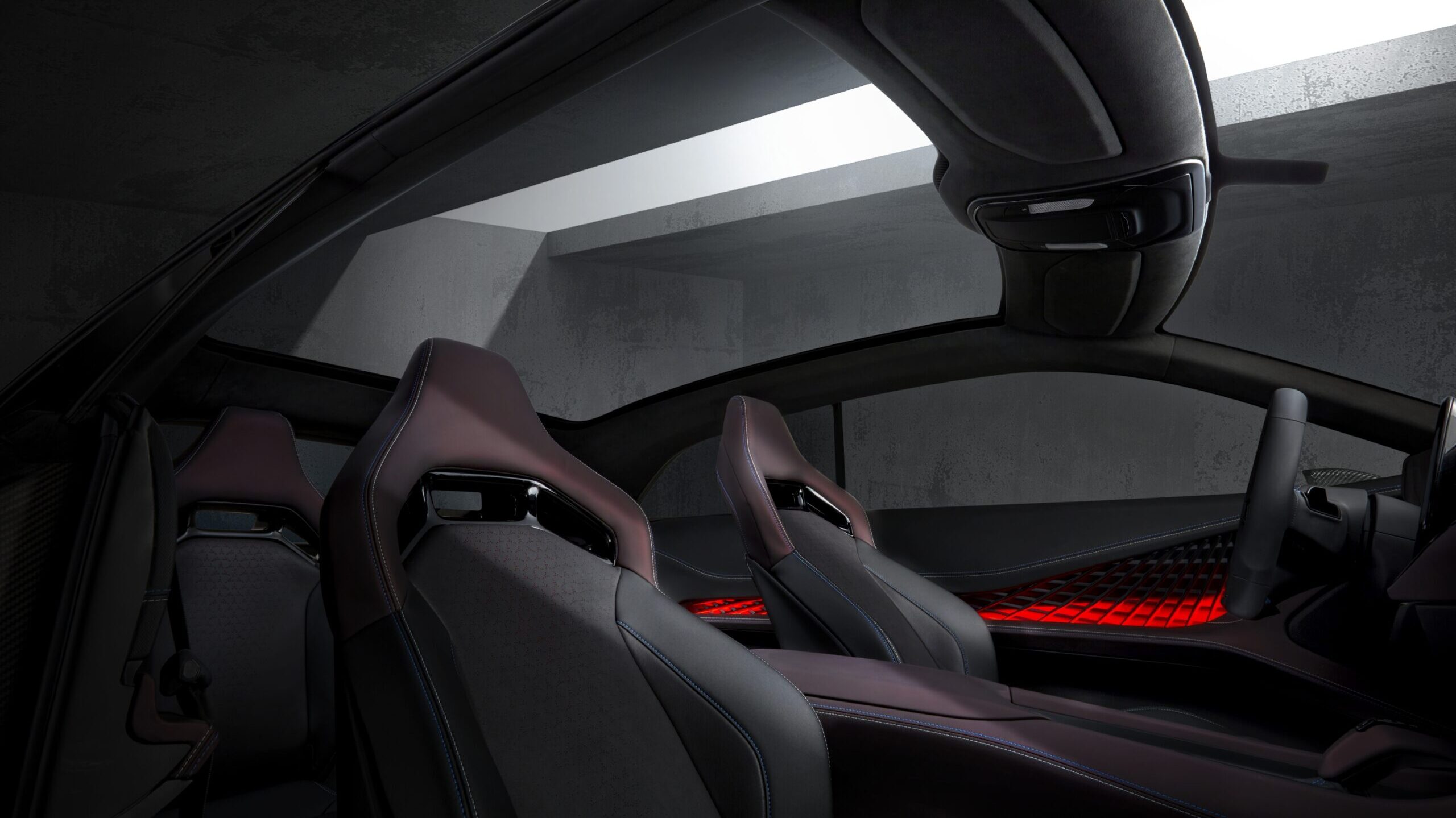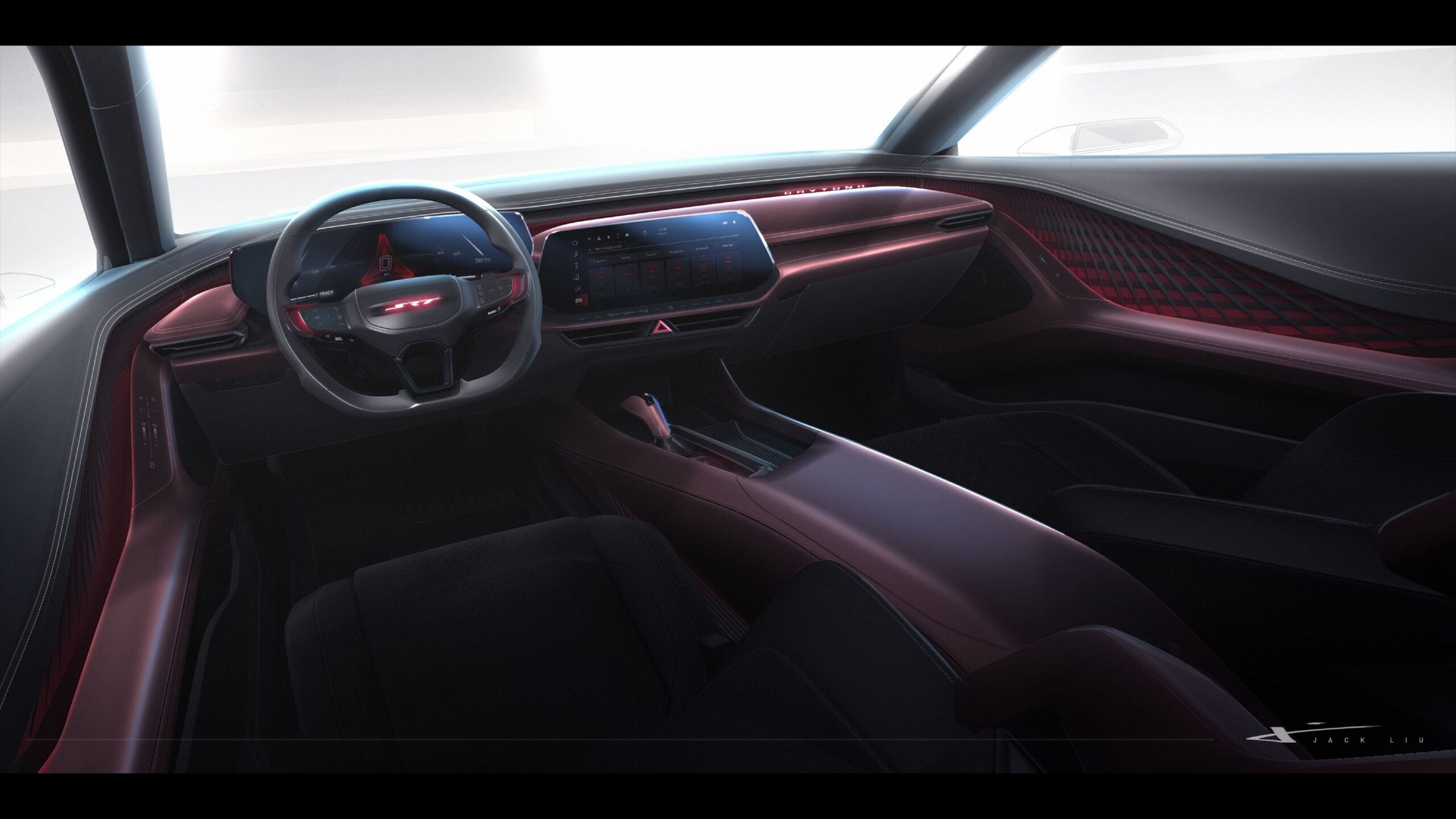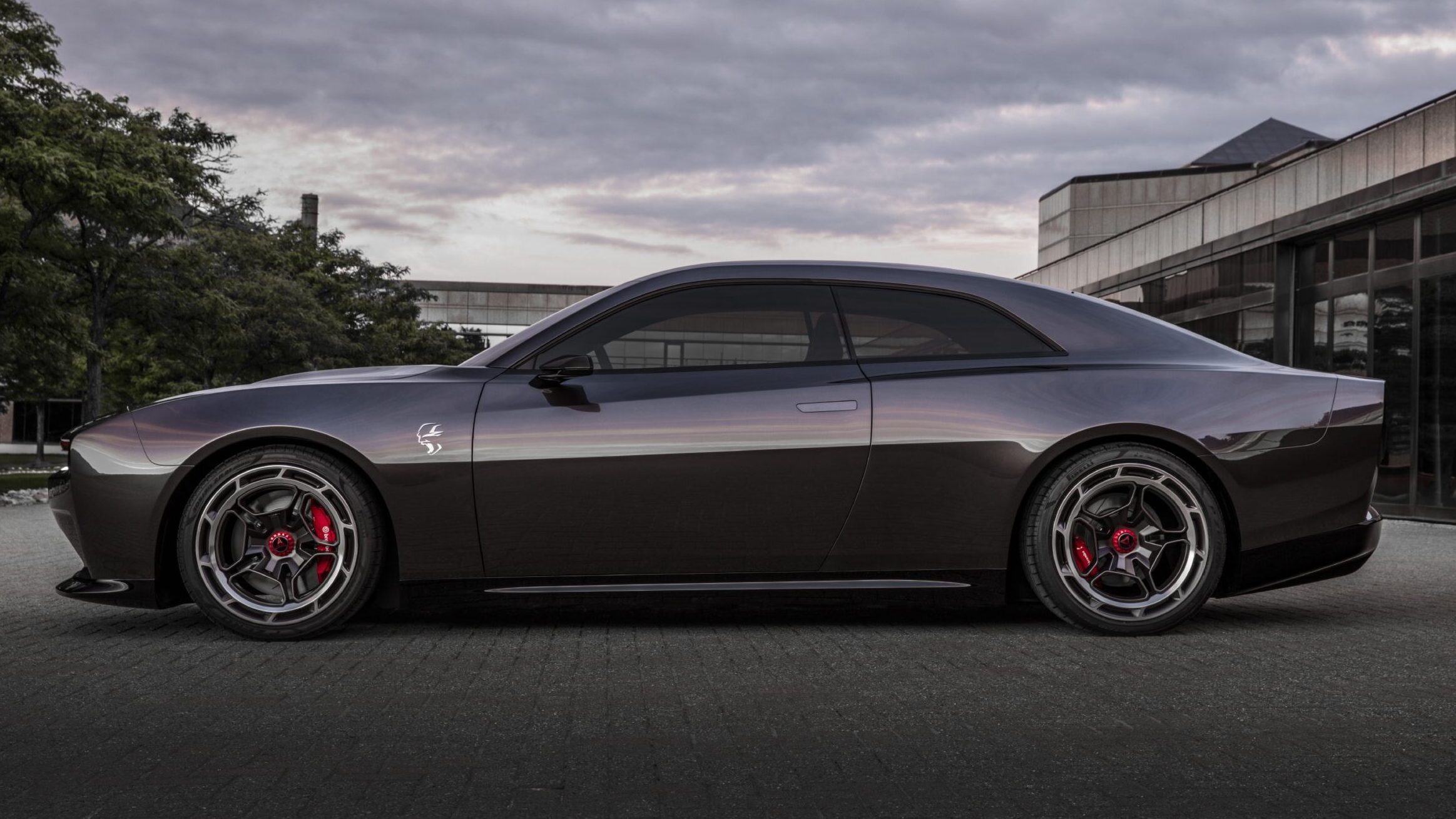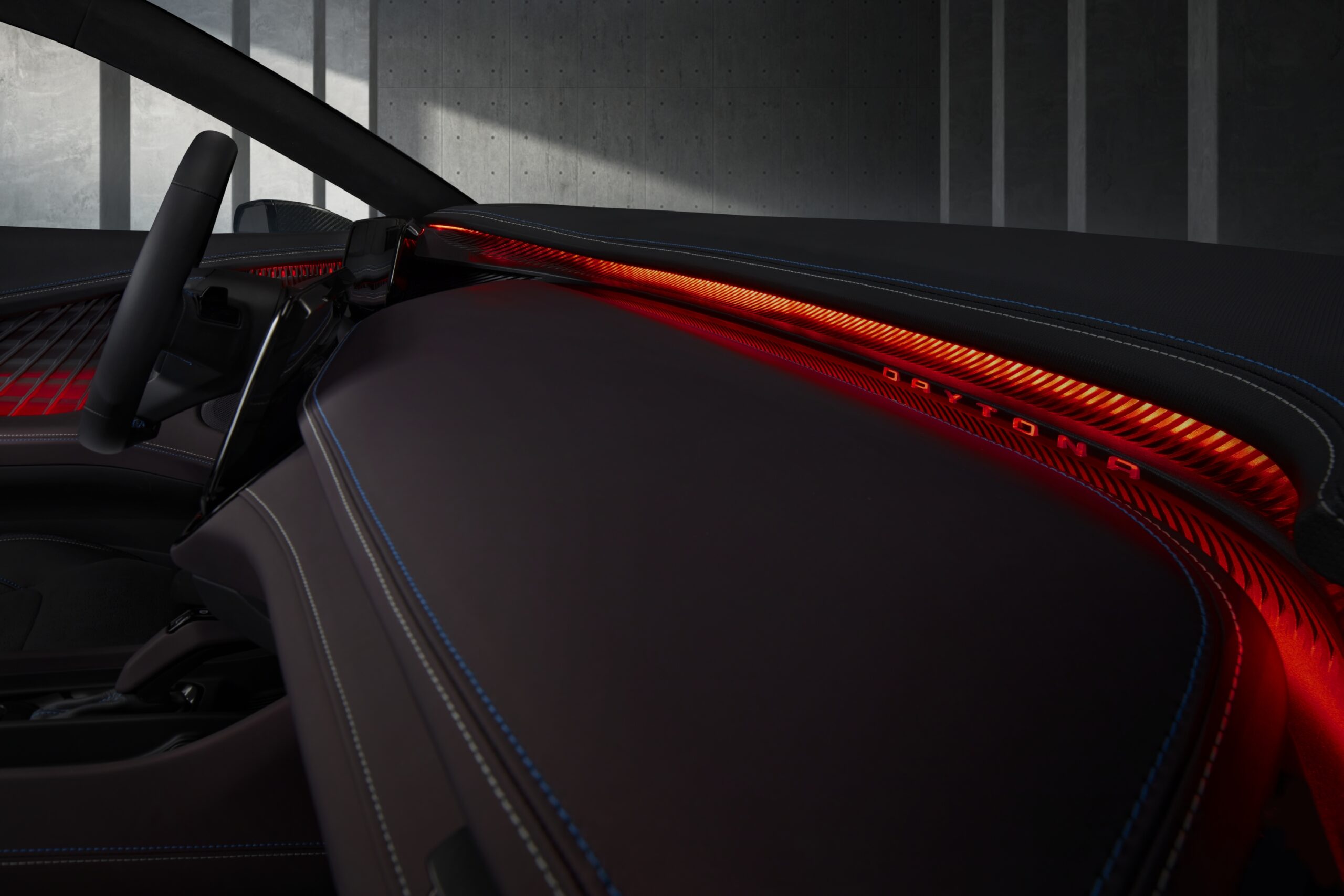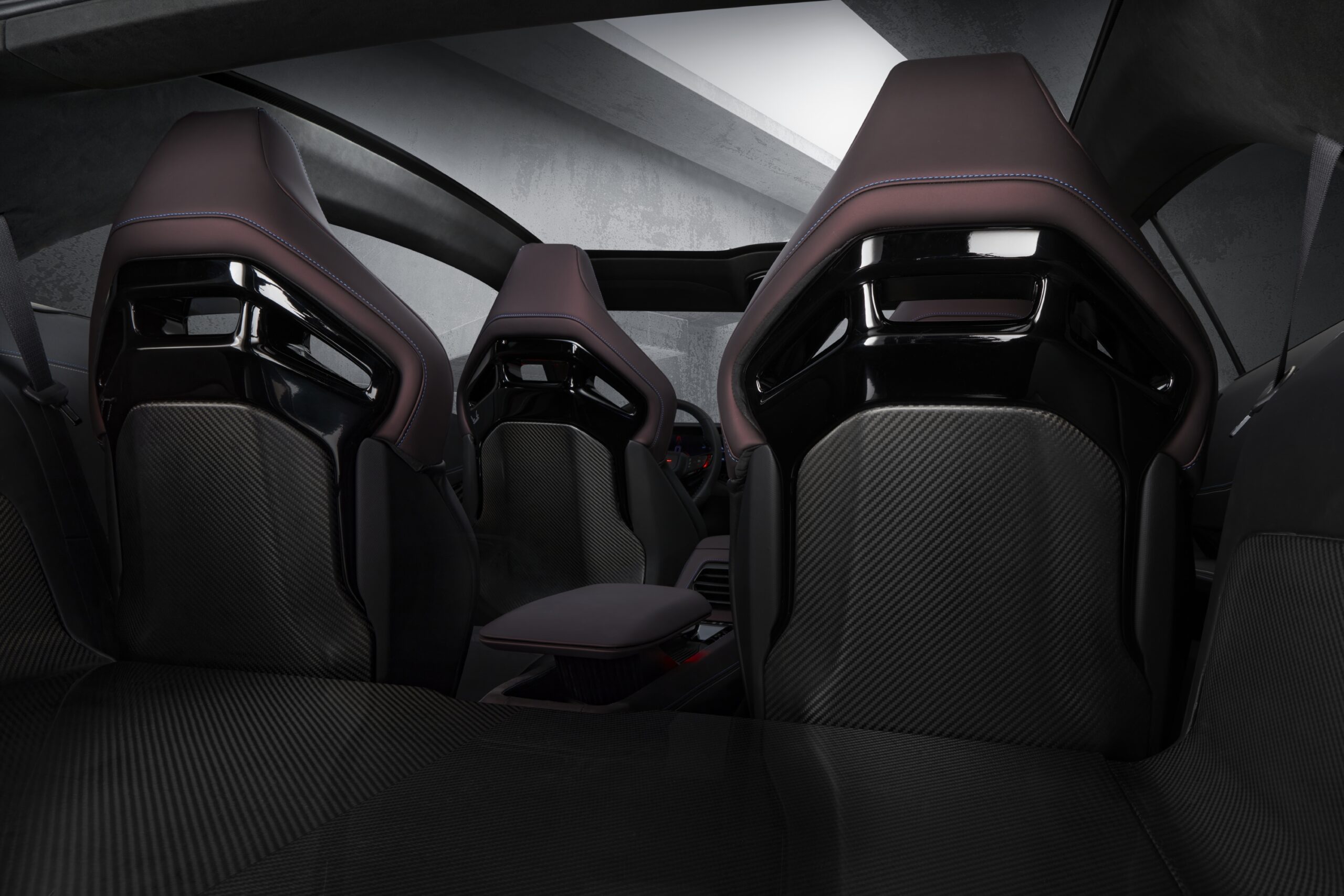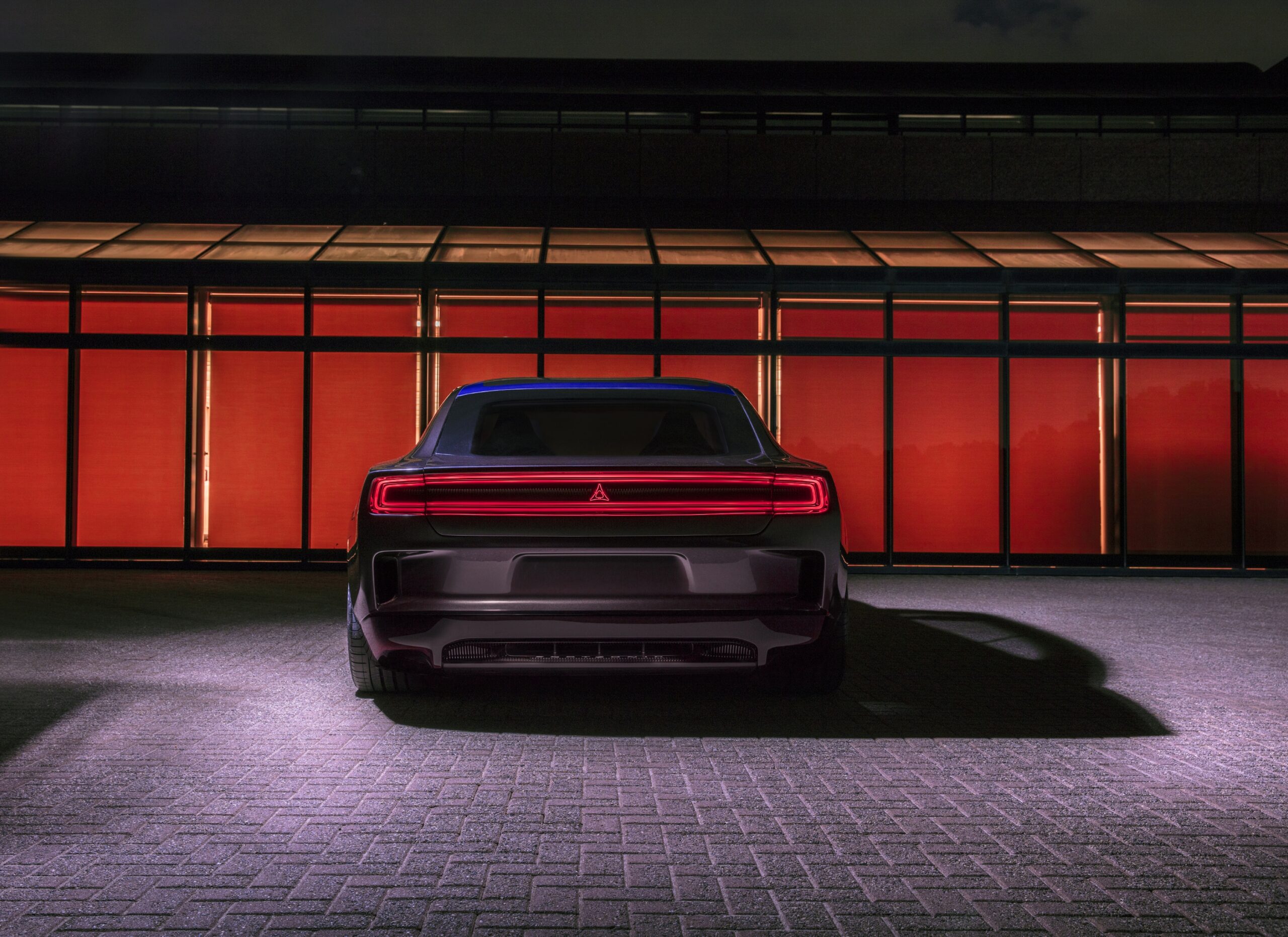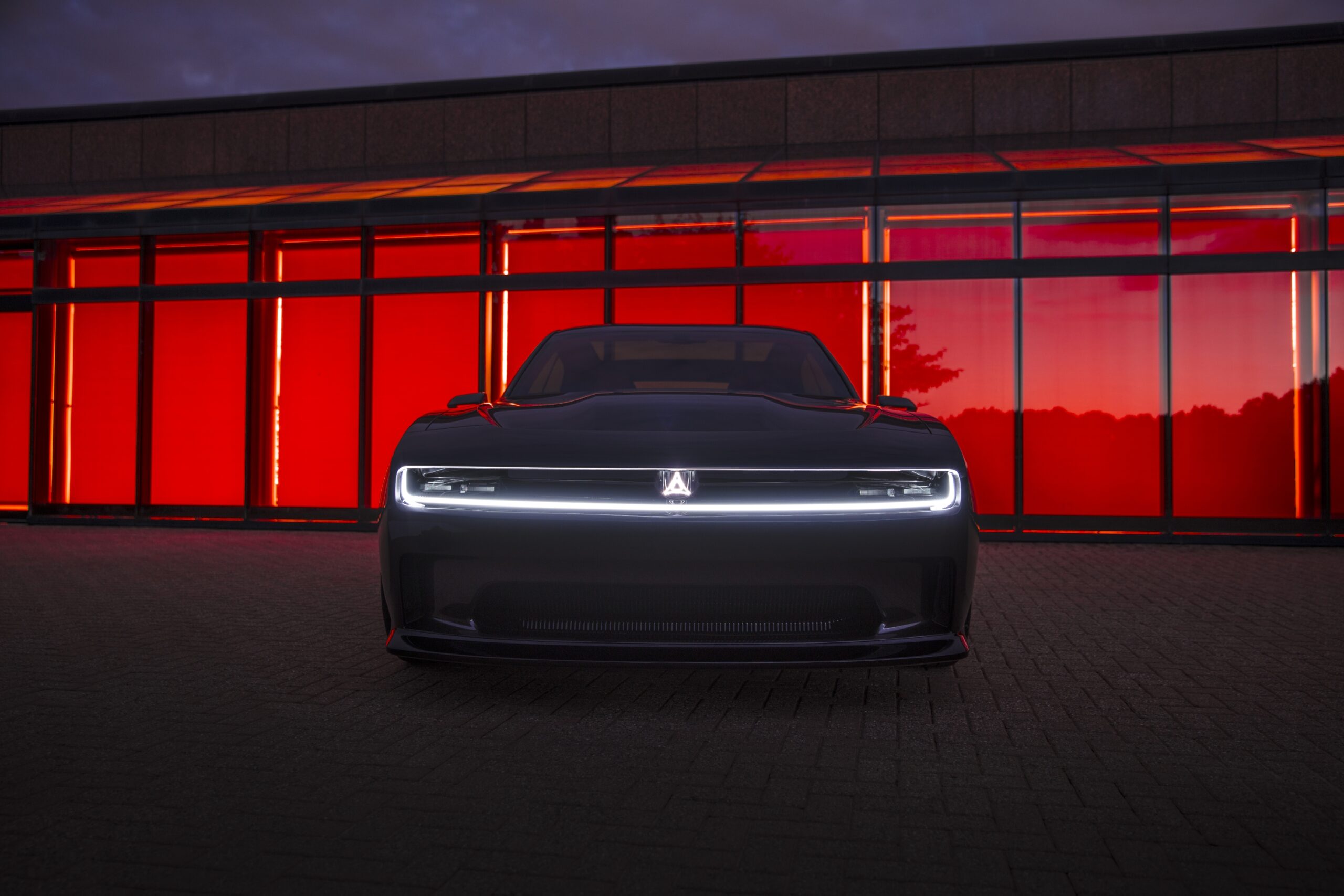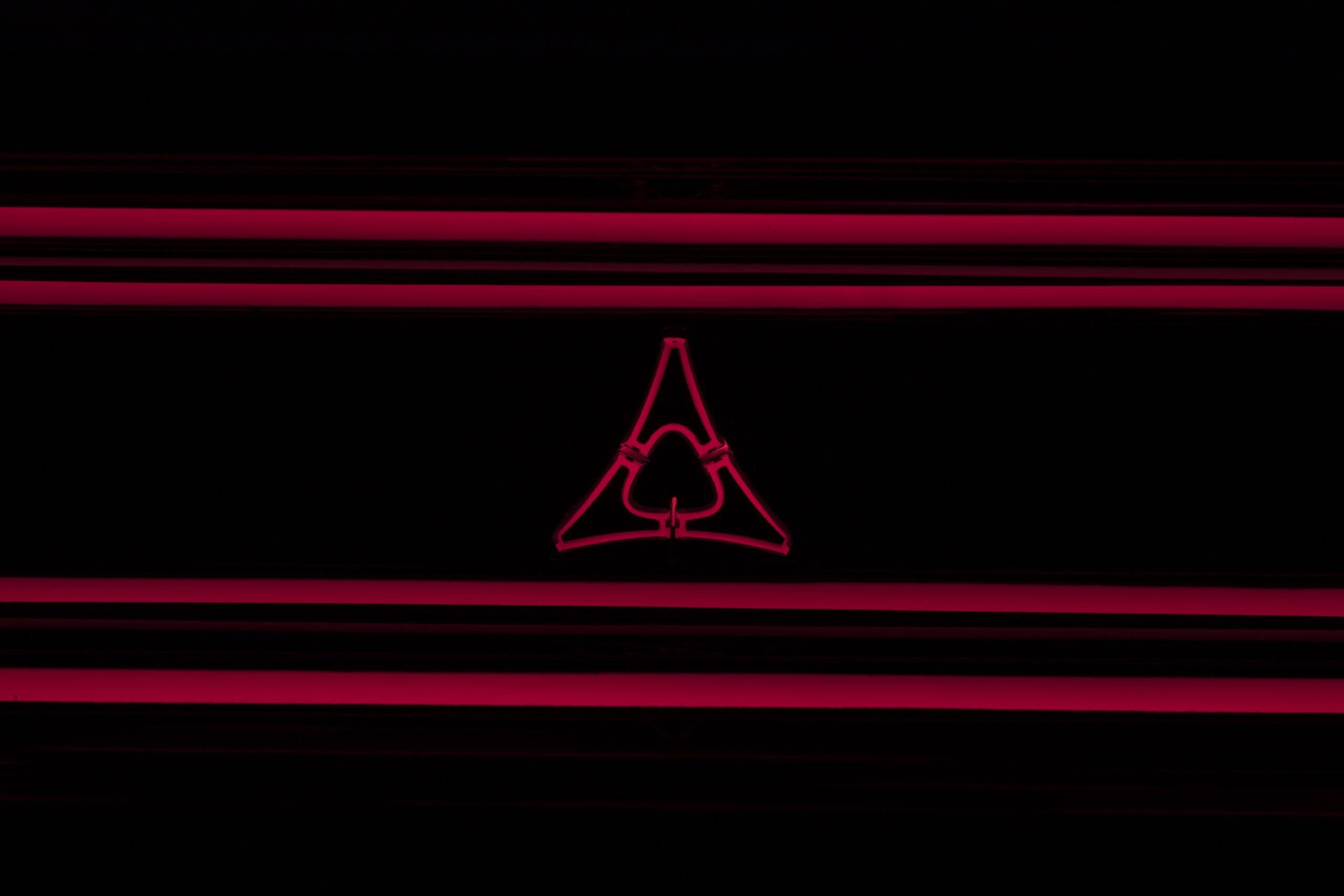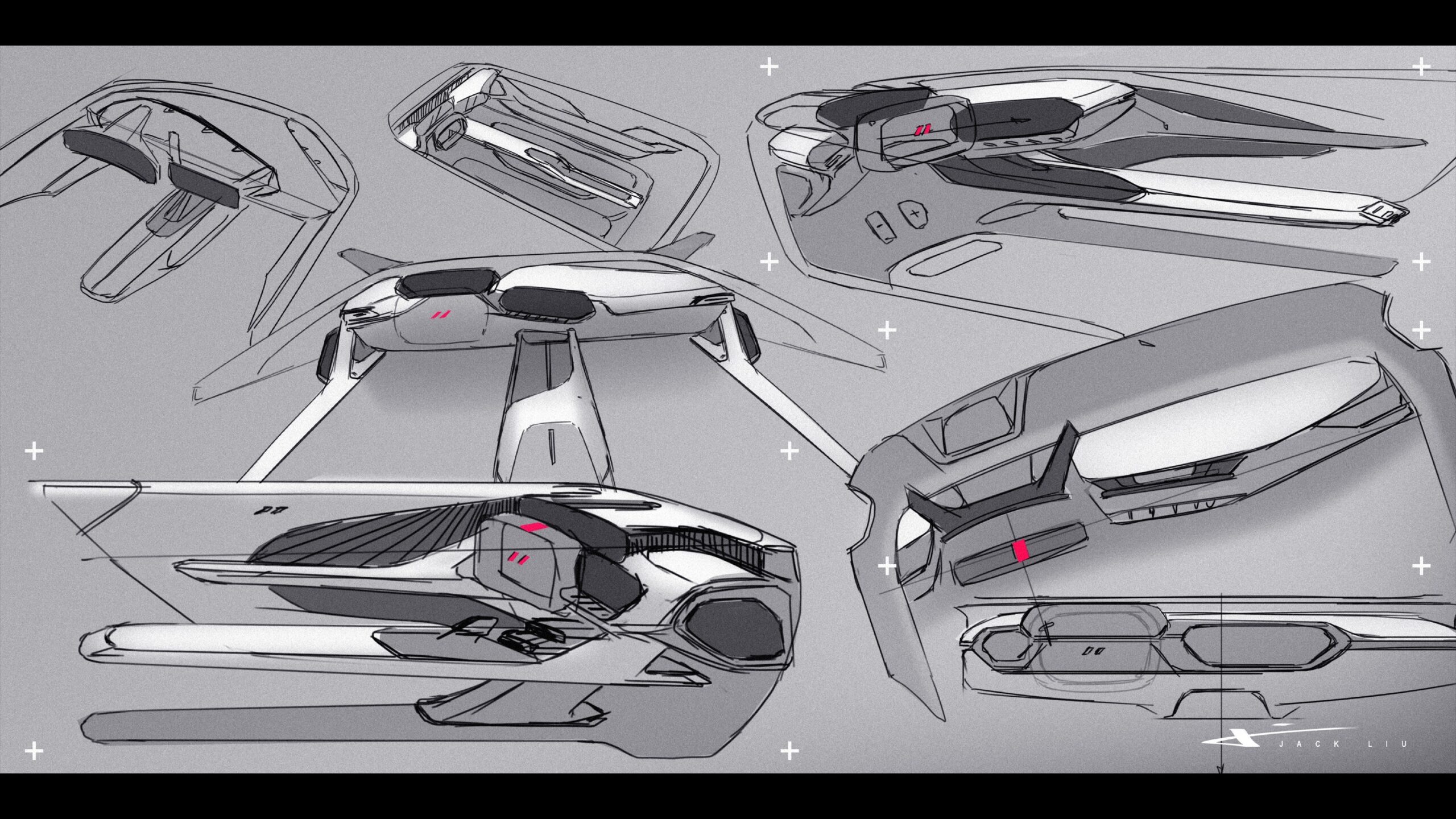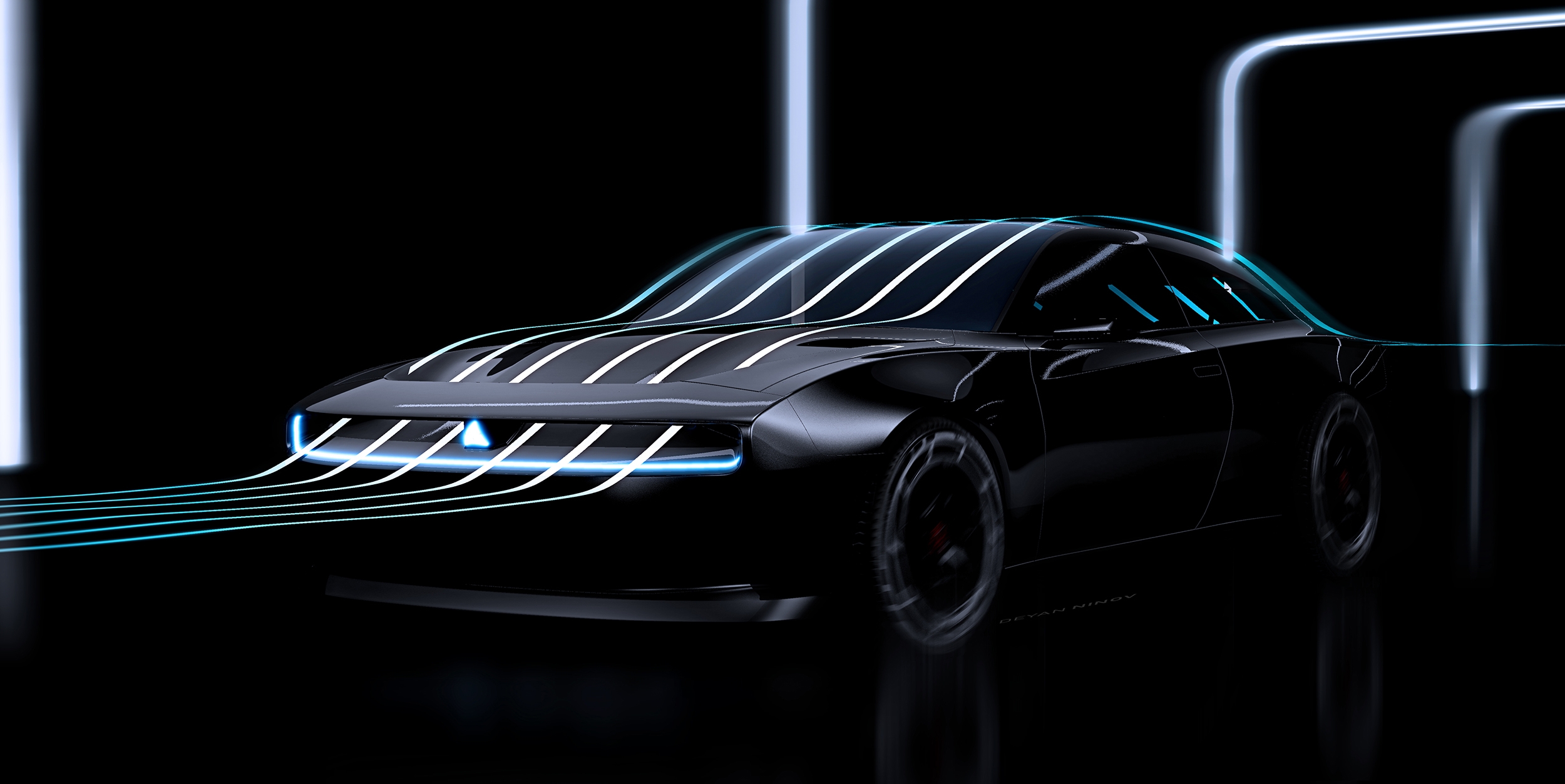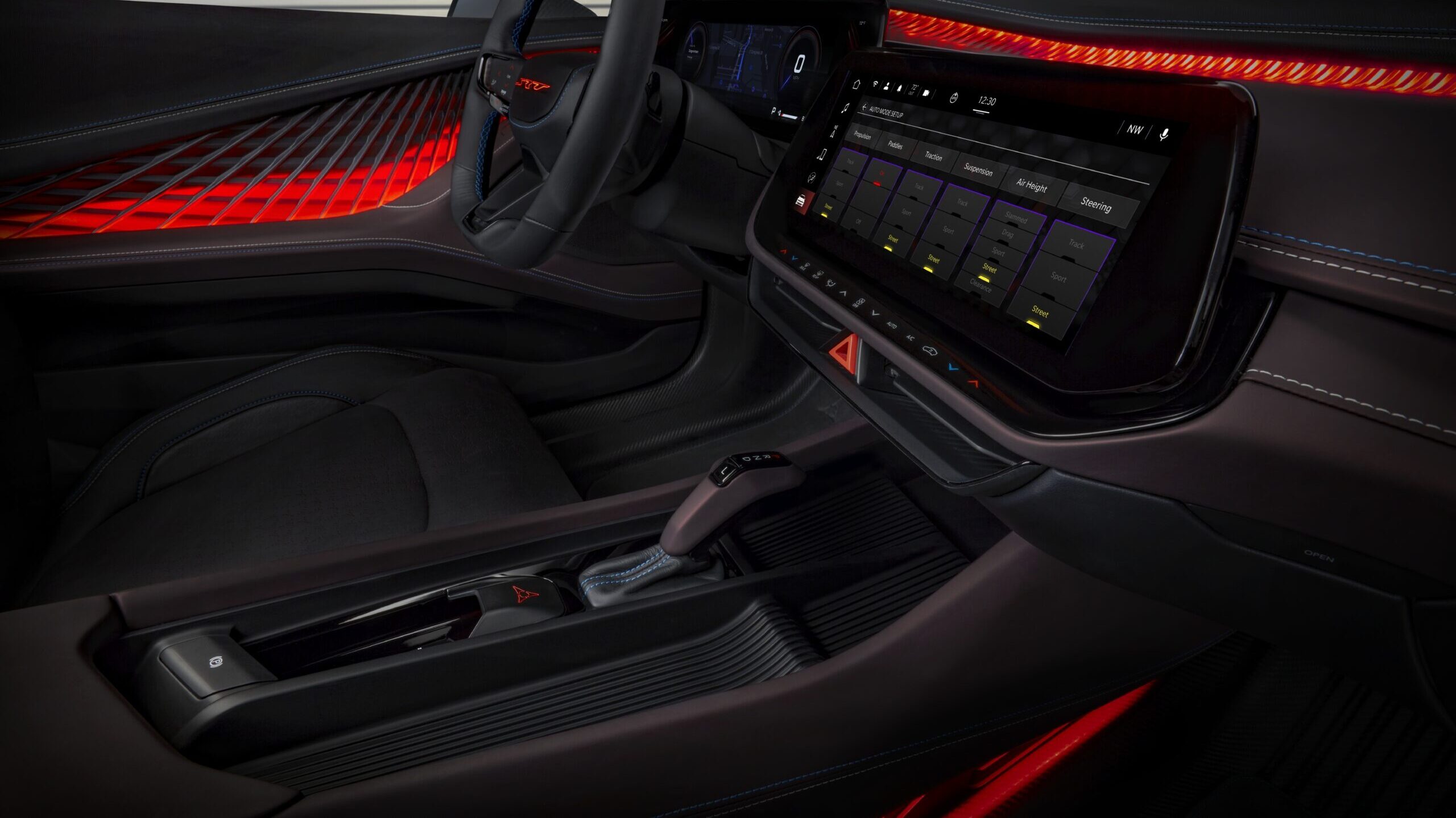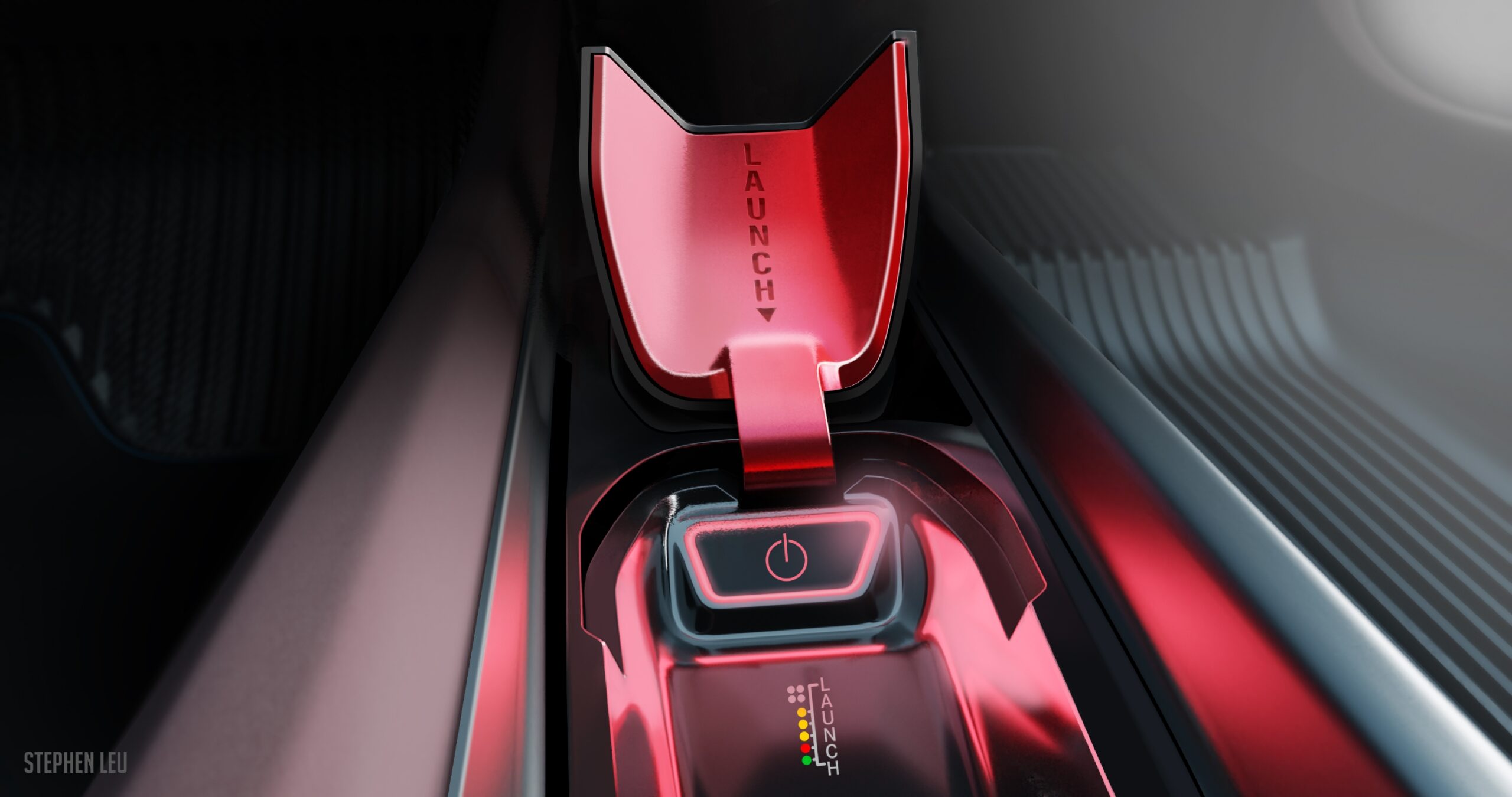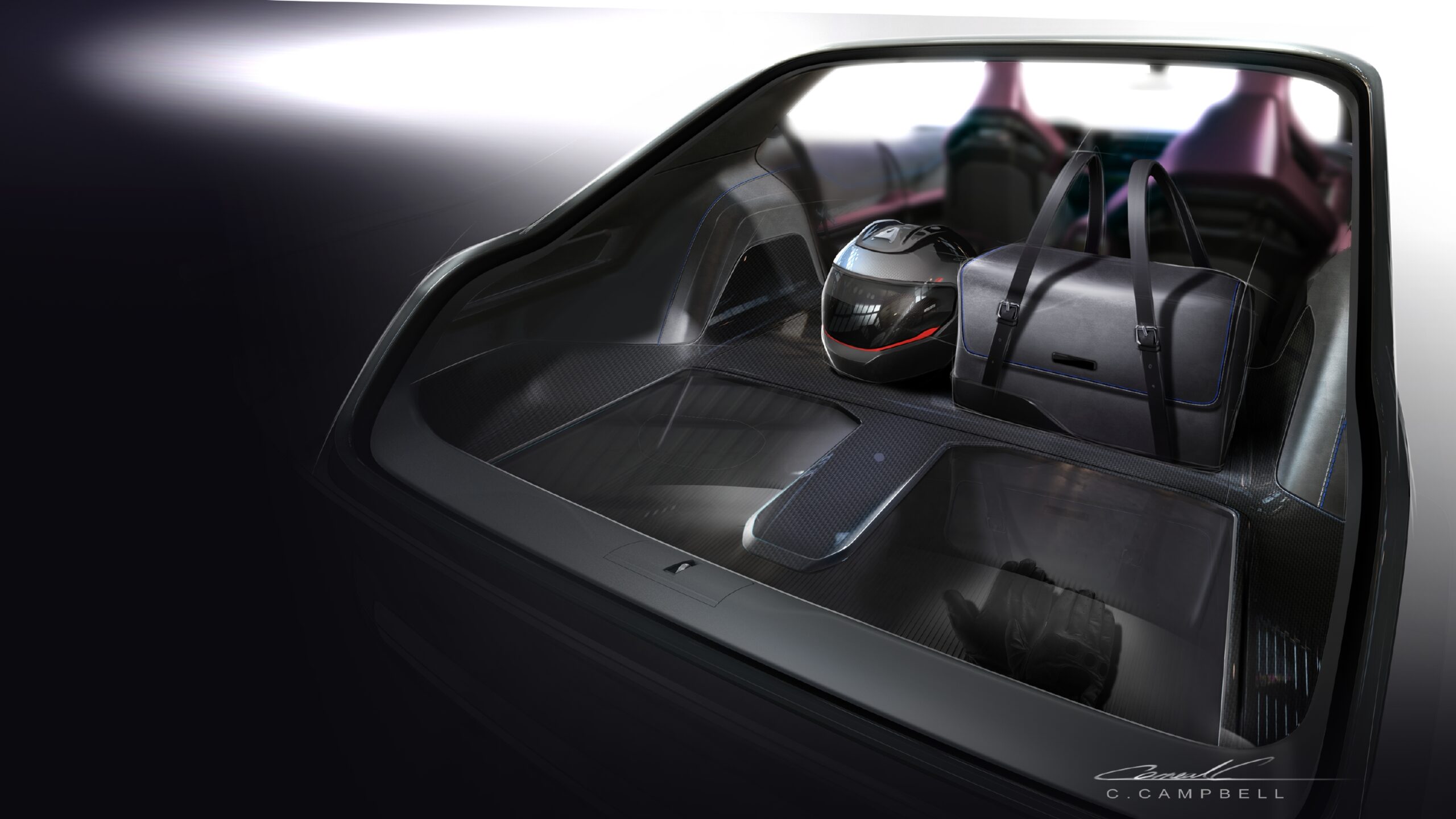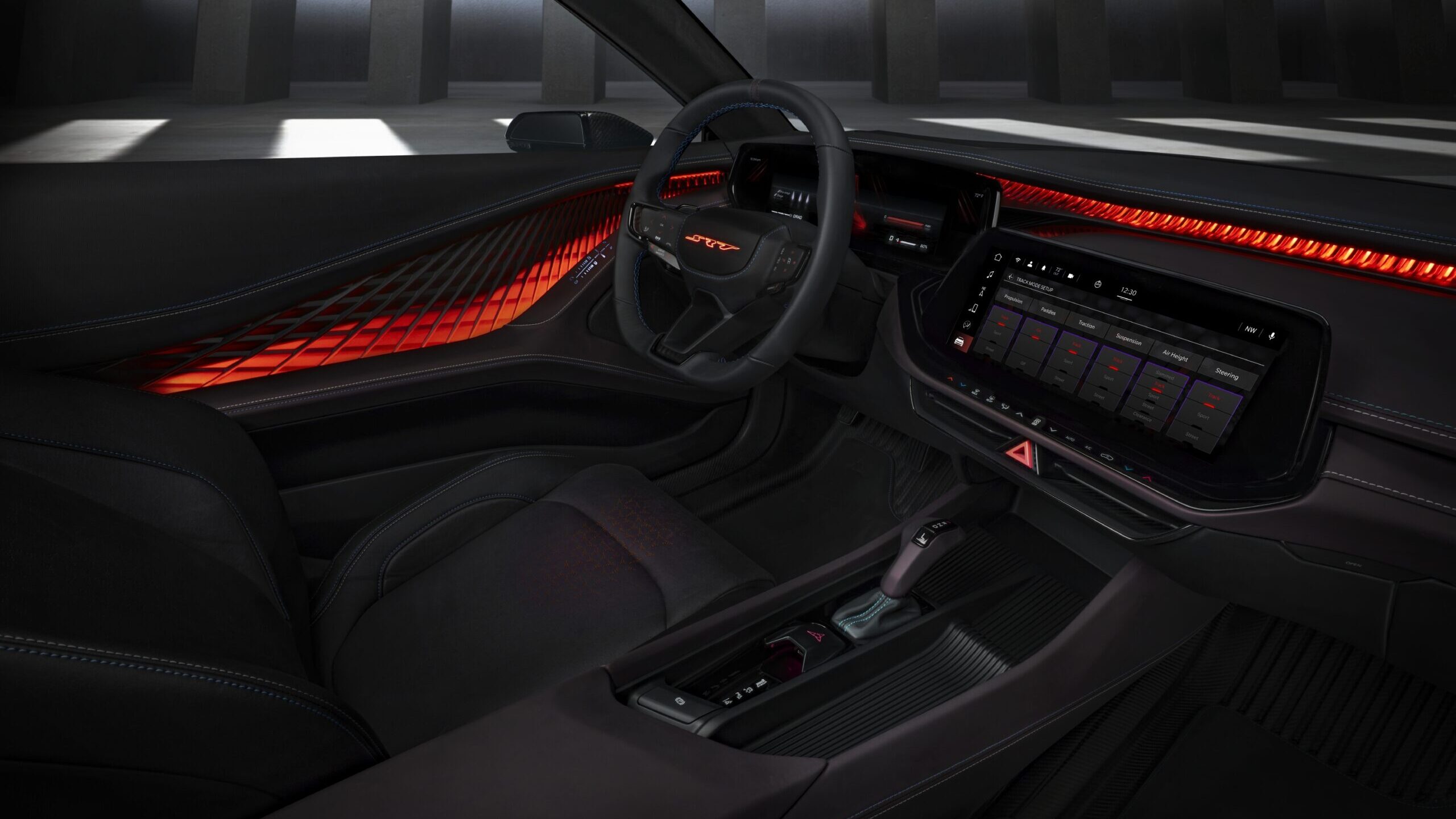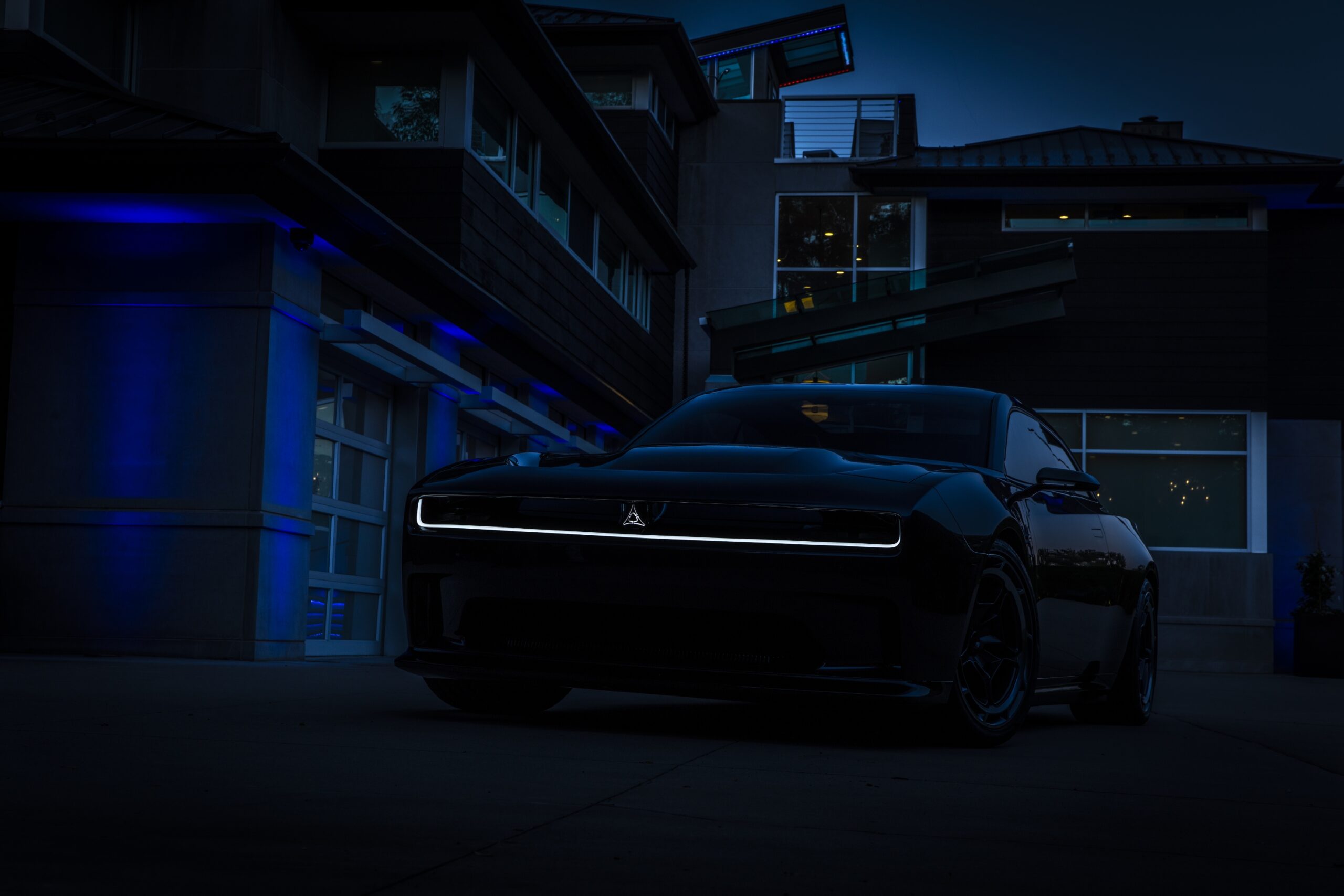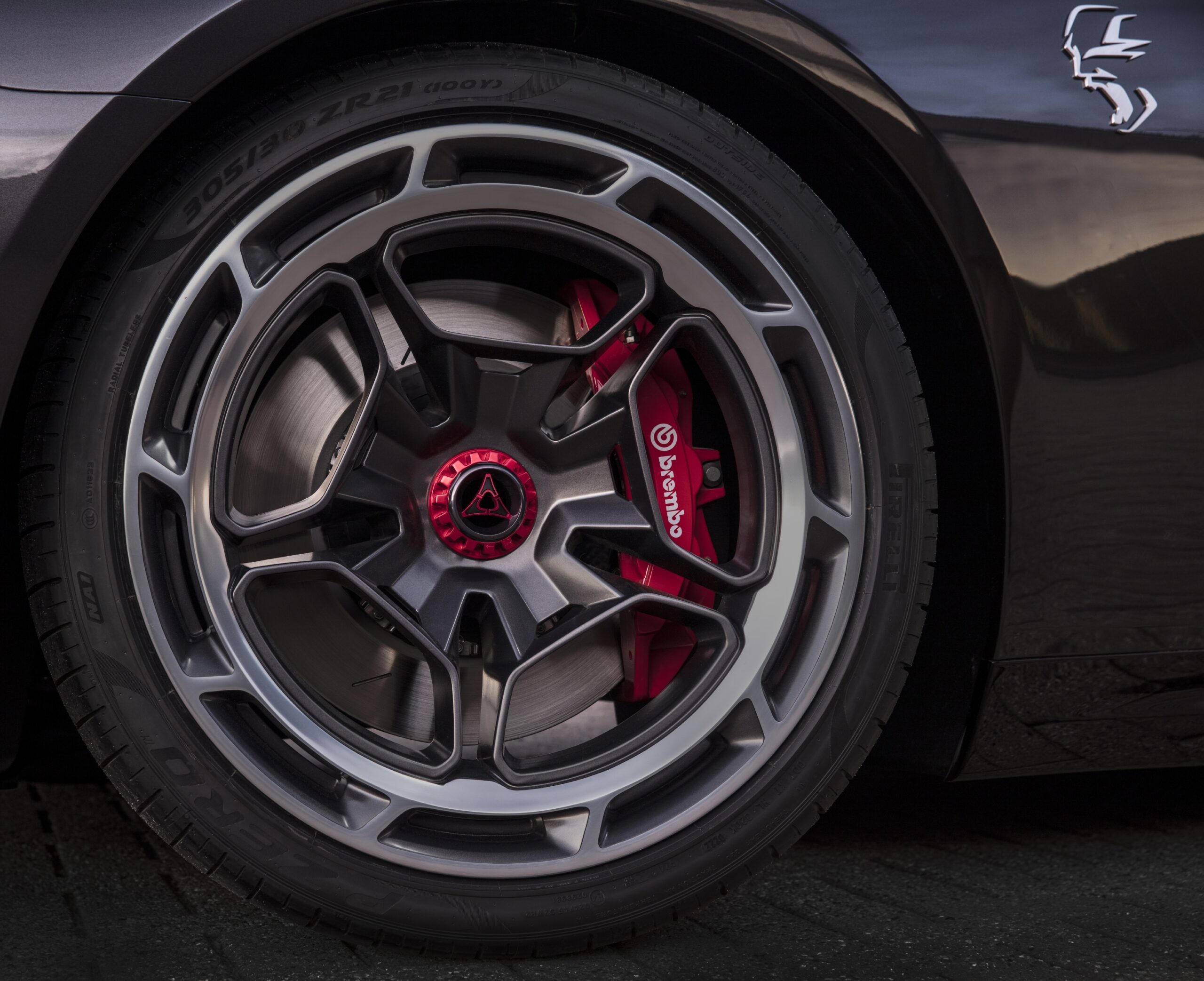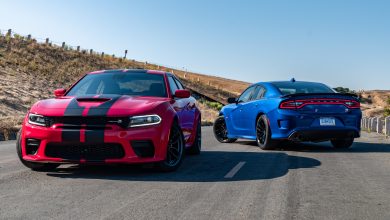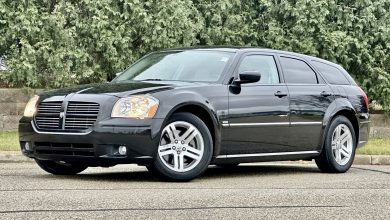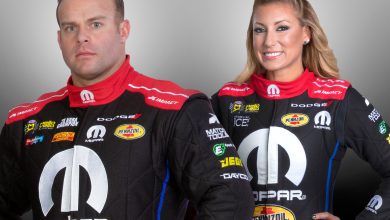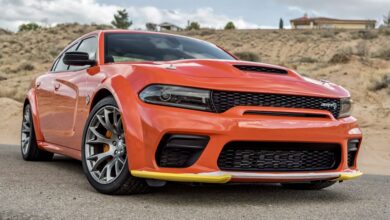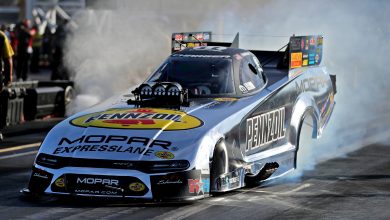Dodge is taking a giant step forward on the performance brand’s road to an electrified future, revealing the Dodge Charger Daytona SRT, a perception-shattering concept that reimagines what a battery-electric vehicle (BEV) can be. The Dodge Charger Daytona SRT Concept offers a glimpse at the brand’s electric future through a vehicle that drives like a Dodge, looks like a Dodge, and sounds like Dodge.
The two-door Dodge Charger Daytona SRT Concept was unveiled today at M1 Concourse in Pontiac, Michigan, during the third day of the three-day Dodge Speed Week event series, which featured announcements and reveals of Dodge performance products.
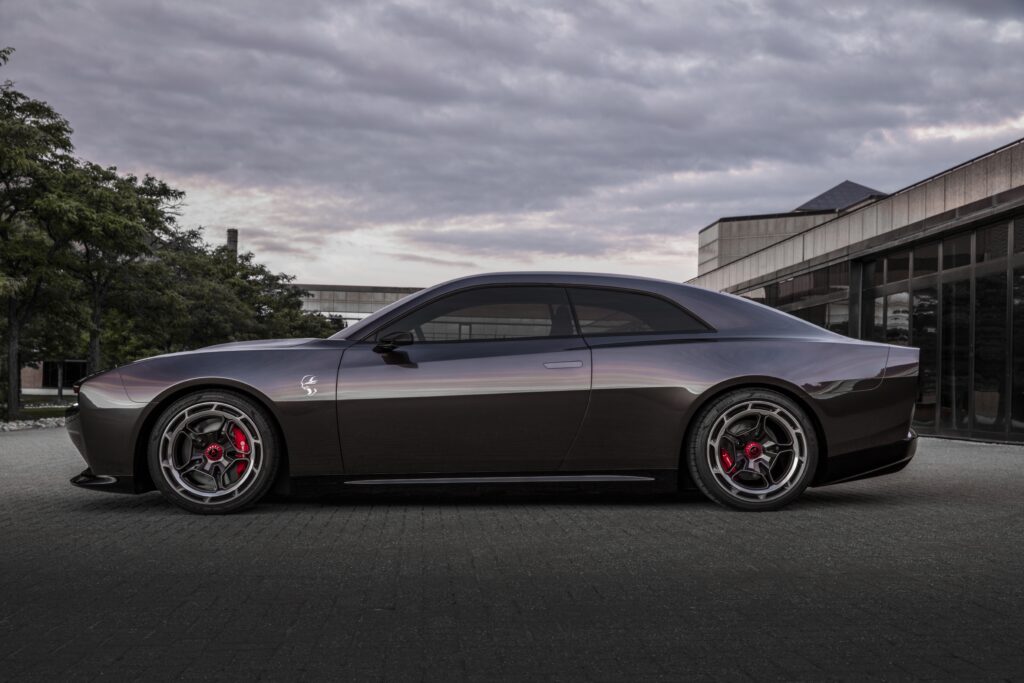
The Dodge Charger Daytona SRT Concept muscles aside the boring BEV paradigm and replaces it with an electrified vehicle unlike any on the road today. A new propulsion system drives the Charger Daytona SRT Concept with performance that exceeds the Dodge brand’s famed SRT Hellcat engine, accompanied by an industry-first BEV exhaust sound.
The concept’s modern exterior styling incorporates subtle Dodge heritage cues while also exceeding aerodynamic targets. Interior design elements connect to create a driver-centric, immersive experience through sounds, displays, and lighting features that change inside and out at the push of a button.
Core to the Dodge Charger Daytona SRT Concept are three game-changing, patent-pending features that will rewrite the rules of the BEV segment:
- R-Wing: A unique aerodynamic pass-through design feature that connects the concept with its iconic Dodge Daytona namesake
- Fratzonic Chambered Exhaust: Industry-first BEV exhaust, can reach 126 dB, making it as loud as a Hellcat-powered Dodge
- eRupt: Multi-speed transmission with an electro-mechanical shifting experience that’s pure Dodge
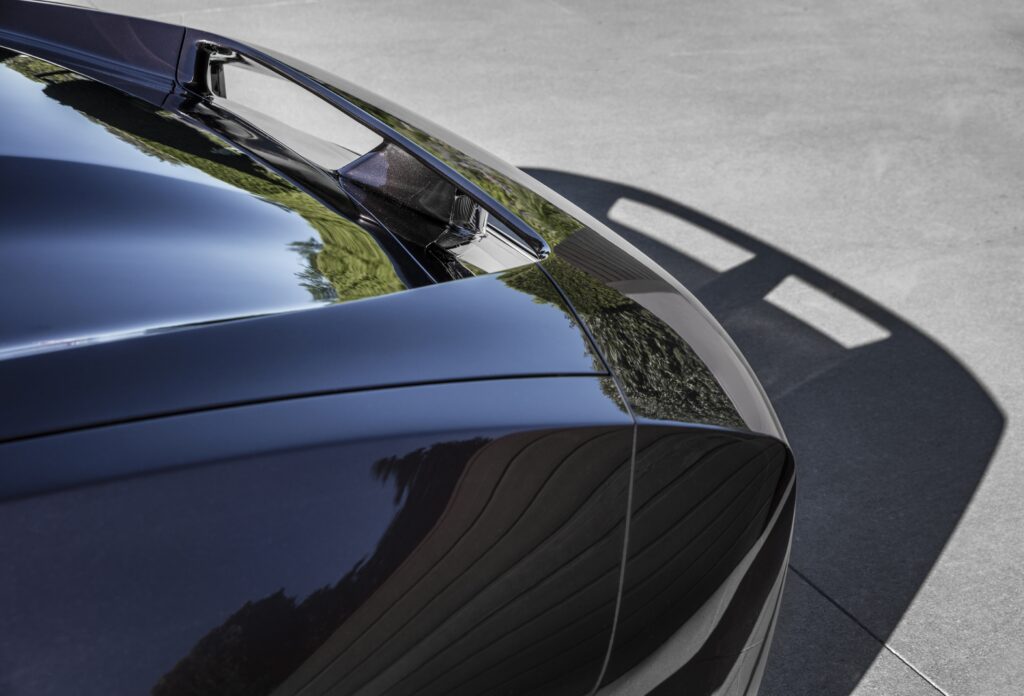
“The Dodge Charger Daytona SRT Concept exists because performance made us do it,” said Tim Kuniskis, Dodge CEO. “Dodge is about muscle, attitude, and performance, and the brand carries that chip on its shoulder and into the BEV segment through a concept loaded with patents, innovations, and performance features that embody the electrified muscle of tomorrow. The Charger Daytona SRT Concept can do more than run the car show circuit; it can run a blazing quarter-mile. And when it comes to product cycles, it outruns Darwin. Charger Daytona does more than define where Dodge is headed, it will redefine American muscle in the process.
“One day ago, the brand’s first-ever electrified performance vehicle was unveiled, the all-new 2023 Dodge Hornet. Today, we revealed a peek at our eMuscle future with the Dodge Charger Daytona SRT Concept. When we said it was going to be an electric summer for Dodge, we meant it.”
Brotherhood, Meet Banshee
Dodge has built a unique reputation as America’s muscle car brand. In the race to be faster, quicker, and more powerful, Dodge is turning the page to a new chapter. The brand’s first-ever electric car isn’t called the Dodge Charger Daytona SRT Concept by coincidence — like the famed Charger Daytona model that was the first vehicle to break 200 mph on a NASCAR track in 1970, the Charger Daytona SRT Concept packs a performance punch.

It does so courtesy of a new propulsion system that joins high-horsepower household names such as HEMI®, Hellcat, and Redeye. There’s a new pinnacle of performance in the Brotherhood of Muscle: Banshee.
The 800V Banshee propulsion system powers the Dodge Charger Daytona SRT Concept car and screams performance, making Dodge’s first electric vehicle faster than a Hellcat in all key performance measures. The standard all-wheel-drive system is key to pushing beyond Hellcat performance while also improving all-weather capability.
eRupt Transmission
Unlike typical BEVs, the Dodge brand’s eRupt multi-speed transmission with electro-mechanical shifting delivers distinctive shift points, throwing shoulders into seatbacks in true Dodge style. The Charger Daytona SRT Concept also boasts a PowerShot push-to-pass feature. Activated by the push of a button on the steering wheel, PowerShot delivers an adrenaline jolt of increased horsepower for a quick burst of acceleration.
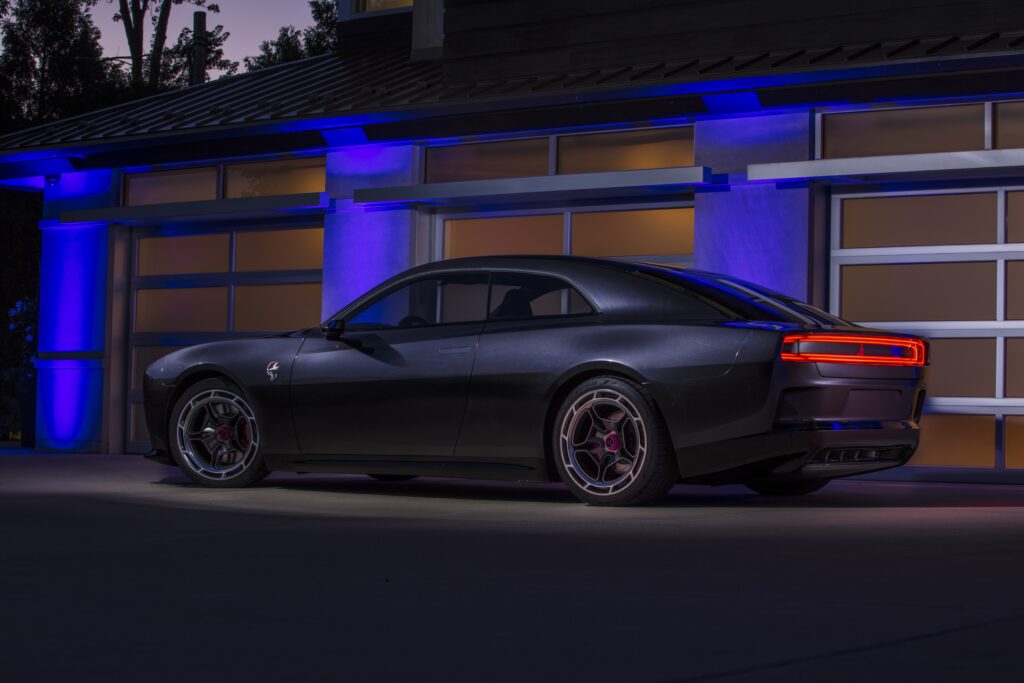
Fratzonic Chambered Exhaust
While most BEVs embrace their virtually silent electric motors, that just wouldn’t do for Dodge. The Charger Daytona SRT Concept voices a 126 dB roar that equals the SRT Hellcat, generated through a new, patent-pending Fratzonic Chambered Exhaust system. Yes, Dodge added an exhaust to an electric vehicle.
The industry-first Fratzonic Chambered Exhaust pushes its one-of-a-kind performance sound through an amplifier and tuning chamber located at the rear of the vehicle. The Fratzonic Chambered Exhaust represents the next generation of tactile, bone-shaking, muscle attitude, creating a visceral “Dark Matter” sound profile experience in concert with the eRupt transmission.
Dodge Design, First and Foremost
The Dodge Charger Daytona SRT Concept features an inspired design that takes on the challenge of revolutionizing the look of a BEV while offering subtle nods to the brand’s muscle car past.
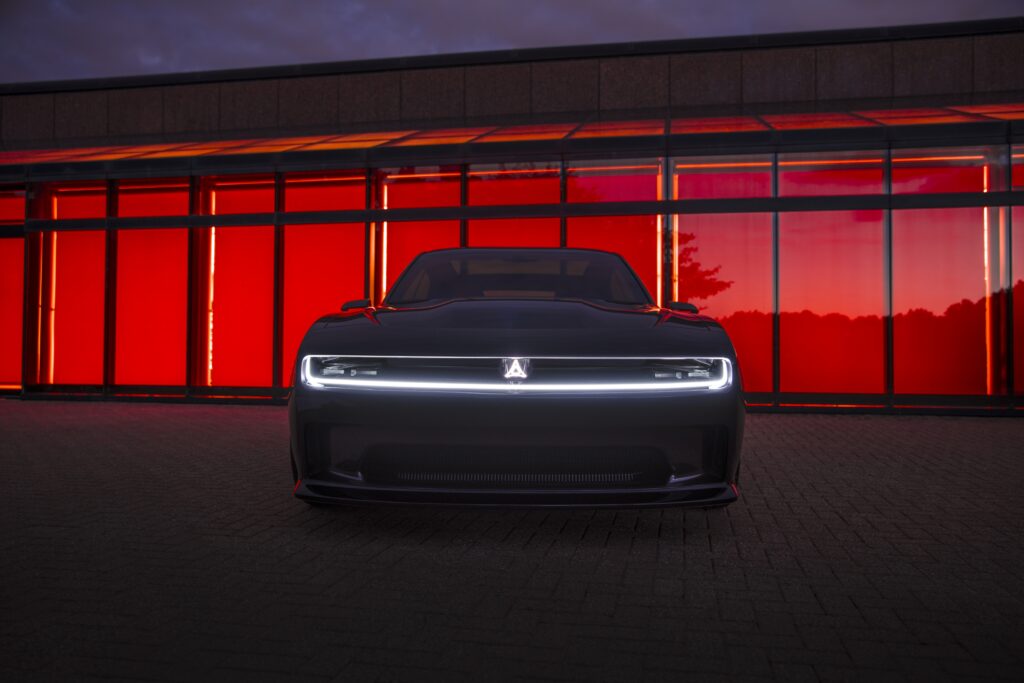
That design principle begins to unfold up front, where the Charger Daytona SRT Concept’s patent-pending R-Wing redefines the typical Dodge front end, maintaining the characteristically blunt Dodge profile while developing a more aerodynamic vehicle.
The R-Wing, an homage to the original Charger Daytona design and to a key figure behind the development of the original vehicle, allows air to flow through the front opening, enhancing downforce. Incorporated into this functional performance hood, the front R-Wing holds true to the brand’s dramatic exterior themes while delivering an aerodynamically improved pass-through design. Carbon-fiber intakes tucked into both sides of the front and rear lower fascias provide an air curtain to assist in aerodynamic performance.
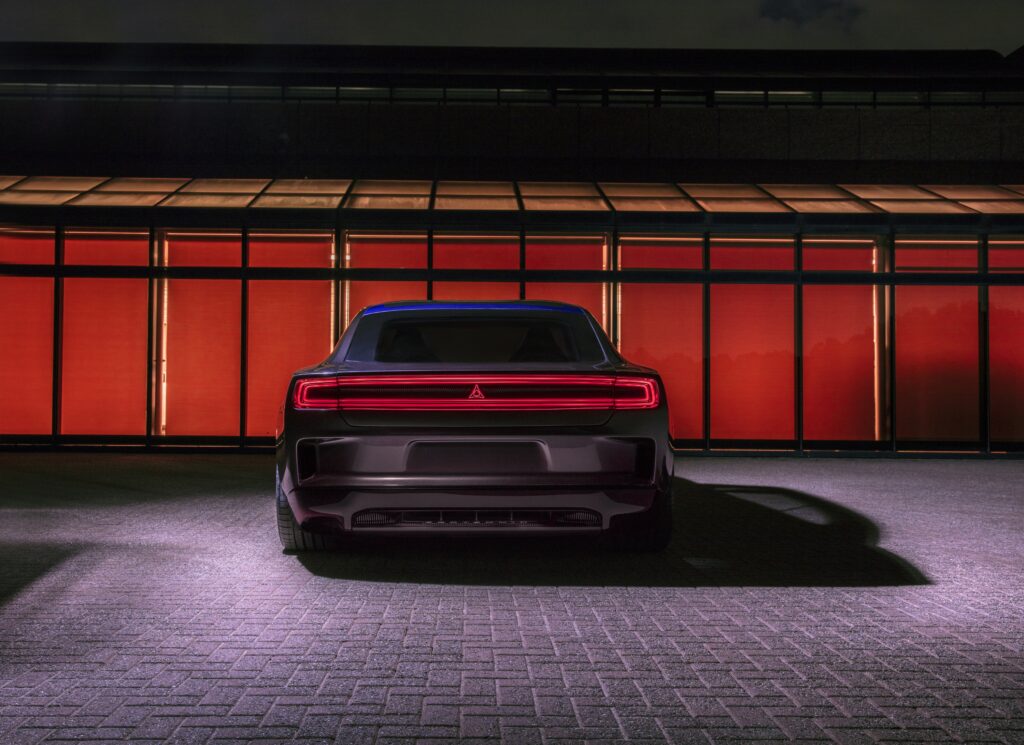
The Charger Daytona SRT Concept combines modern looks with a long, wide, and confident road presence. The front grille stands out with cross-car illuminated lighting centered by a white illuminated Fratzog badge, a symbol teased last year by the Dodge brand. The three-pointed Fratzog badge, originally featured on Dodge muscle cars from 1962 through 1976, was previously used without any meaning or context — until now. The return of the Fratzog logo represents the electrified future of Dodge and signifies the brand’s unwavering commitment to its performance heritage, but with new technology capable of pushing limits well beyond the cars of today.
Simple, vertical details on the front grille add texture while calling back to the brand’s heritage, specifically the iconic 1968 Dodge Charger. The concept distills performance to its simplest form, enhanced by a typically playful Dodge exterior color name, Greys of Thunder, that gives high-gloss graphite feel with deep textures. The concept’s “waterline” tracks around the sides and gives a planted look while emphasizing the upper portion, keeping the visual weight up high. The subtle, muscular shaping of the wheel fenders accents the body styling.
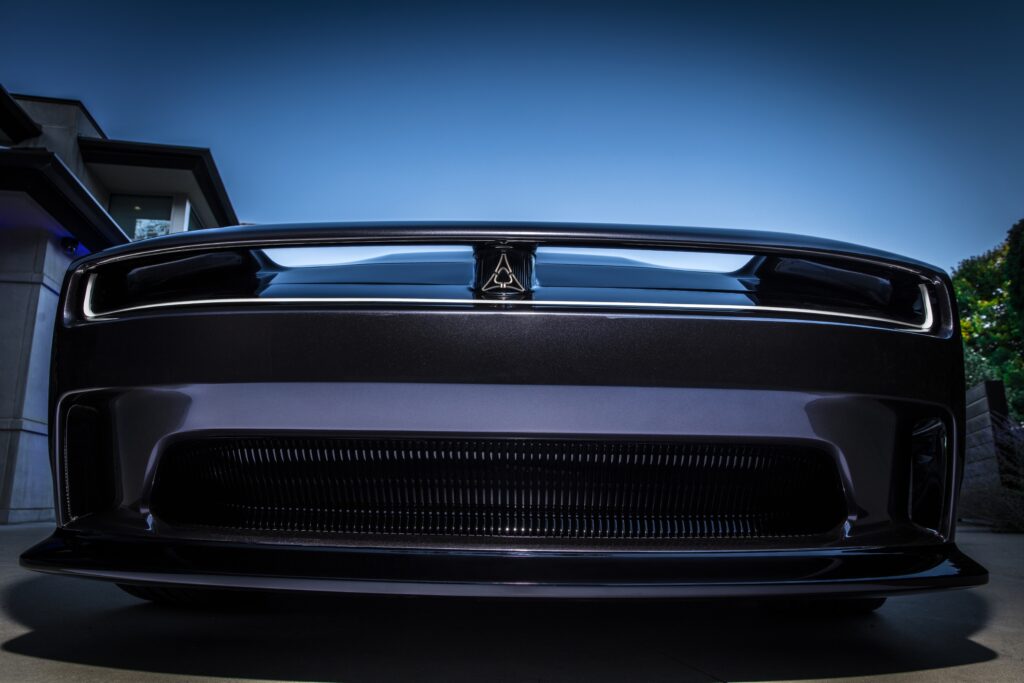
The vehicle avoids excess decoration — headlights almost disappear, hidden underneath the R-Wing, and are integrated seamlessly into the aerodynamic surface providing just the functional elements needed for forwarding lighting. Both the front and rear lighting features a full-width design centered by a 3D illuminated Fratzog badge. The exterior lighting elements are truly unique – even in the dark, you’ll know the Charger Daytona SRT Concept’s silhouette. Flush door handles continue the minimalist design. Brushed aluminum “screaming” Banshee fender badges announce the new propulsion system that drives the concept.
Painted-pocket 21-inch wheels with diamond-cut faces continue the aerodynamic efficiencies with a turbine-like design, and a red Fratzog logo embellishes the wheel center locks. Grey six-piston brakes provide the stopping power.
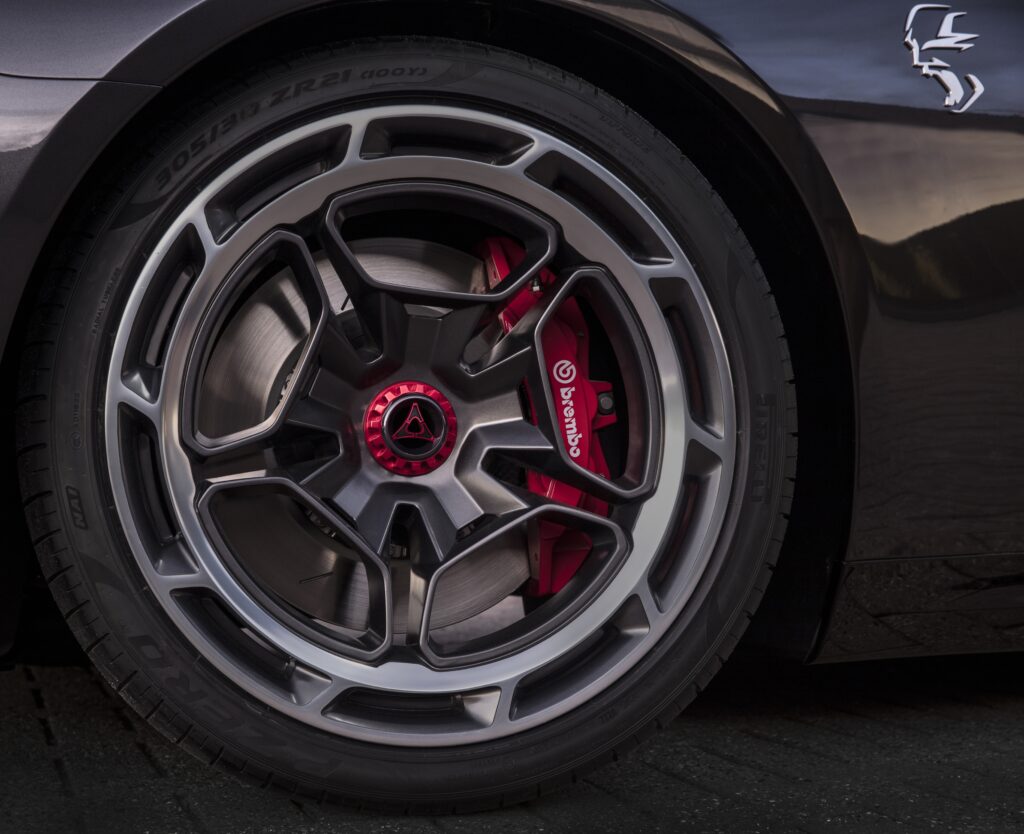
A new hatchback design is highly functional, giving the concept a dual personality: a beast at the track that can still meet everyday needs. The design, along with rear seats that fold flat, offers unexpected utility and storage capacity from a muscle car.
Connected, Driver-centric Interior
The Dodge Charger Daytona SRT Concept’s interior is modern, lightweight, and athletic, providing a driver-centric cockpit with all essentials cohesively packaged.
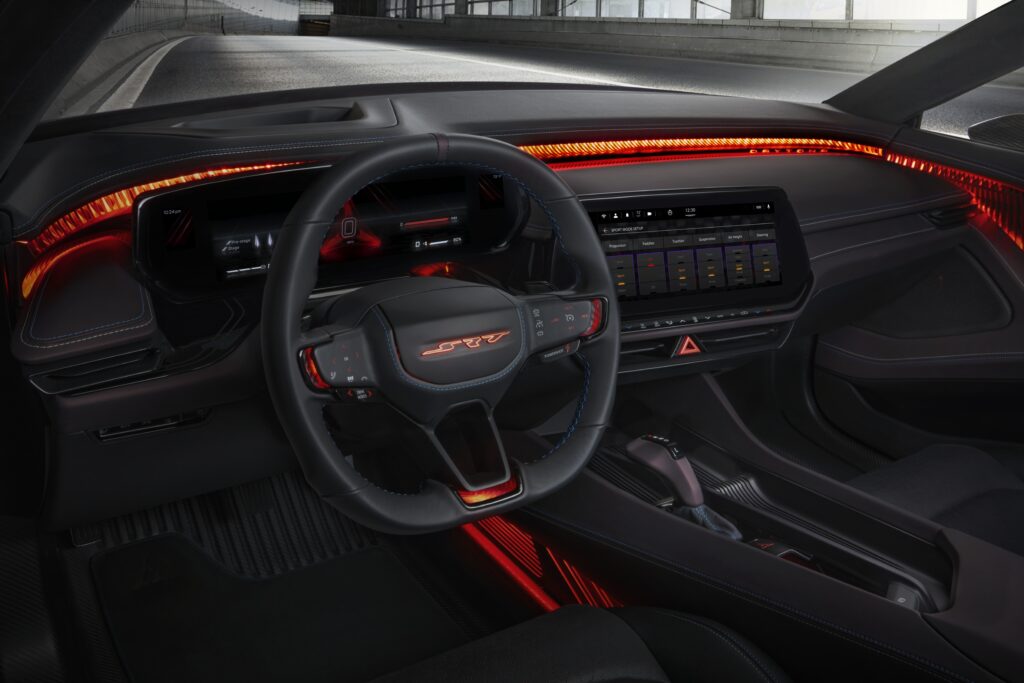
The 12.3-inch center screen, the largest featured in a Dodge vehicle, angles nearly ten degrees towards the driver, and the 16-inch instrument cluster is curved, creating a cocooned, driver-focused feel. An 8-by-3-inch Head-up Display (HUD) puts additional vehicle information where the driver needs it. The slim, instrument panel (IP) and mid-bolster in Ultraviolet color with blue and silver accent stitching feature a “waterline” that extends across the car. The upper IP is a step higher, an elevation change that creates a sculptural surface floating above the cluster. The Ultraviolet color also touches multiple interior surfaces, such as the console, doors, and seats, creating a halo that works with the Attitude Adjustment Lighting™ to enhance shadows and highlights.
A parametric texture unites the interior and provides a connection to the exterior by continuing the inspiration of the 1968 Charger grille detail on the inside. The parametric pattern adds fluidity and sculpture, spanning from the IP to door appliques, beneath the console and continuing to the rear armrests and rear console. The dynamic interior texture has a three-dimensional quality that bounces light and is reactive to the environment, with lines that radiate as they move rearward. Ambient Attitude Adjustment Lighting™ illuminates the texture from below, playing with depth and dimension.

Circuit-like graphics originate on the carbon fiber floor and are strategically placed to surround occupants, flowing under the seats, moving to the center console and IP, and coming back to the driver, a subtle detail that acts as a circuit board, connecting one to another. A unique lightning bolt shape on the accelerator pedal hints at the concept’s electrified powertrain, as does the dual Blue Plasma and Silver stitching that surrounds the entire interior. Carbon fiber door sills feature illuminated white Daytona lettering, with lighted Daytona lettering also found at the top right of the mid-bezel.
The doors and center console follow the sculptural design theme, including only the needed elements. A pass-through area under the console creates a much lighter feel, and clever center console touches include a jet-fighter-inspired cap that flips up when engaging the start button. The unique pistol-grip shifter is inspired by the past but with modern execution, functioning as a mechanical precision piece that delivers an effortless shift experience when squeezing the pistol grip’s trigger.
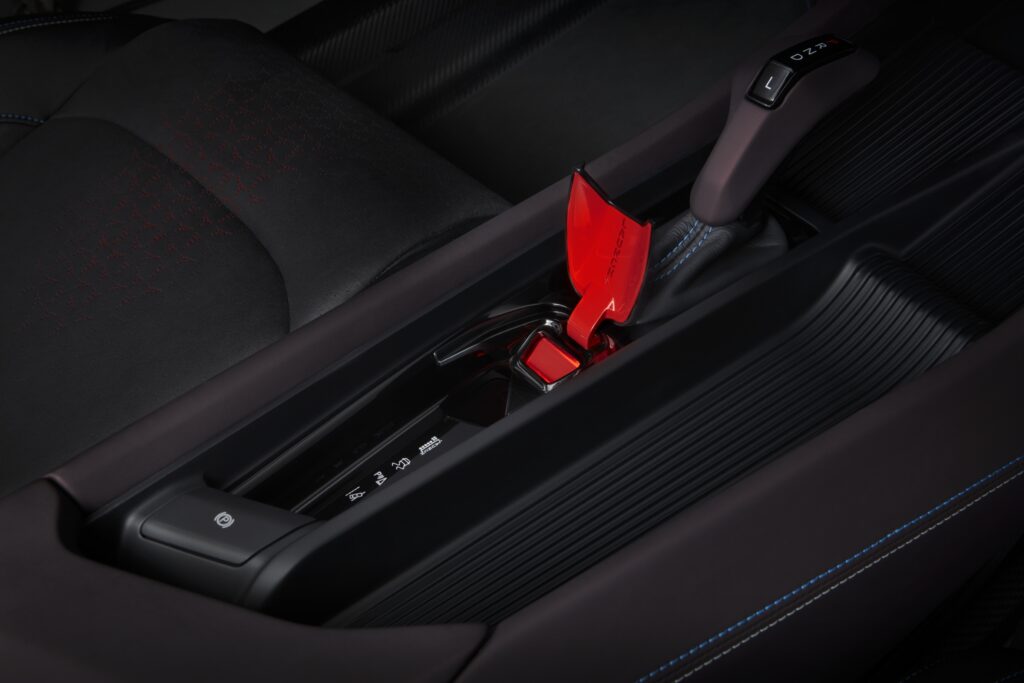
A new steering wheel design offers a thinner feel, with a flat top and bottom. The center spoke of the steering wheel is not connected to the rim, giving the steering wheel a floating feel. Paddle shifters are mounted on the steering wheel, with the PowerShot button on the right and drive mode controls on the left. Like the doors, the steering wheel features capacitive touch controls. An illuminated red SRT logo lights up the steering wheel center.
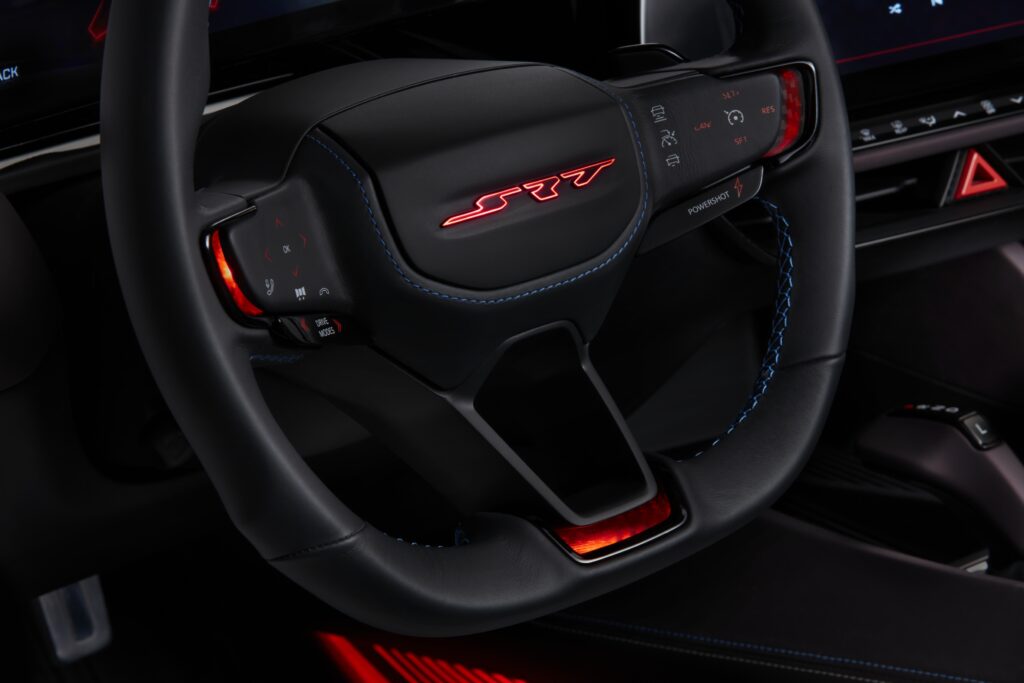
Dodge Charger Daytona SRT Concept seats are lightweight, race-inspired, and slim in design, with an insert that features an abstract, perforated pattern of the Fratzog logo. The unique pattern fades out as it travels down the seat and reappears as it flows toward the center of the seatbacks. The upper seatbacks feature openings and seat bolsters that provide an airy, race-oriented feel while holding occupants.
The panoramic glass roof gives an open-air feel to the Charger Daytona SRT Concept, helping to include rear passengers in the vehicle experience. The parametric interior texture extends to the headliner surrounding and accentuating the glass area. The carbon fiber “tub” floor and hatch are race-inspired lightweight features, and the large cargo area along with fold-flat rear seats provides more storage space than any previous Dodge muscle car.
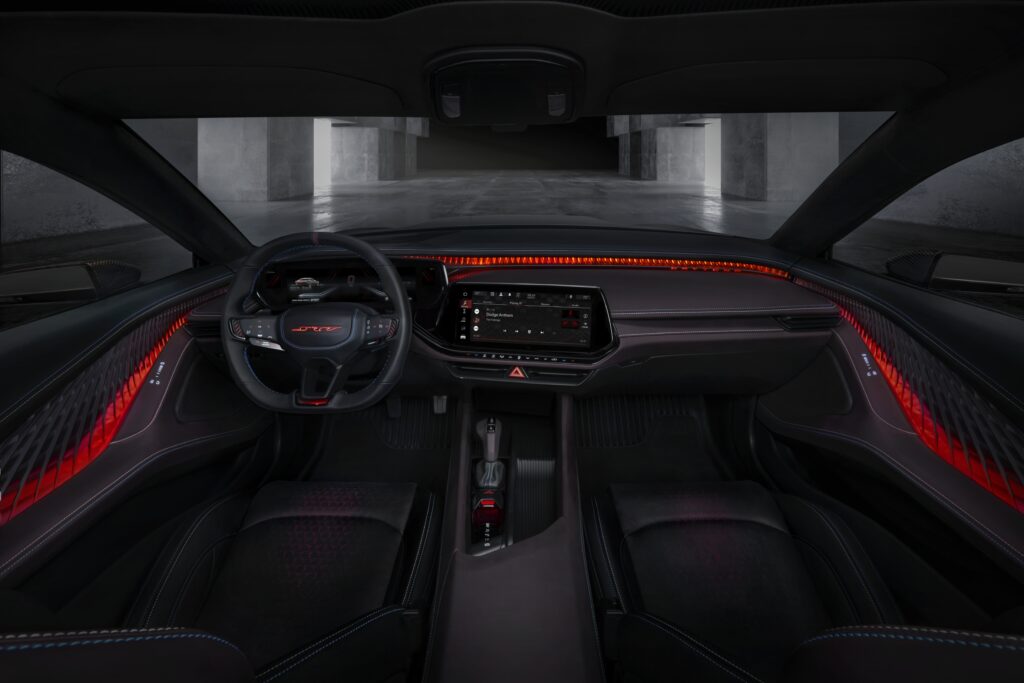
Immersive, Electrified User Experience
The Charger Daytona SRT Concept’s cockpit immerses the driver’s sensory experience through performance sounds, lighting features, and vehicle displays.
A simple one-button press on the steering wheel lets the driver pick from Auto, Sport, Track and Drag modes, instantly changing the driving dynamics, instrument cluster information, HUD content, performance sound, and interior lighting features of the vehicle.
